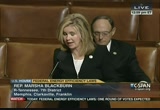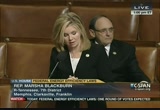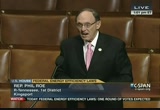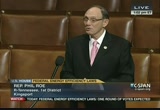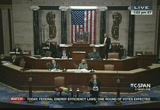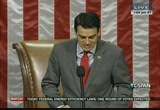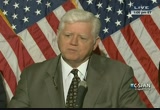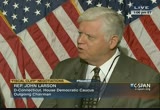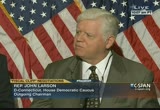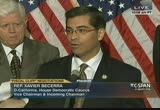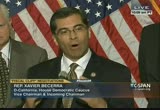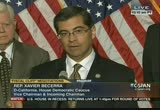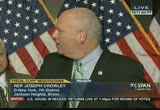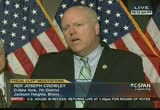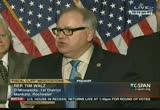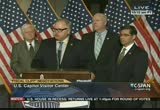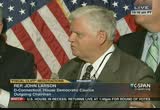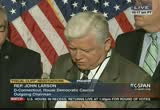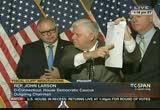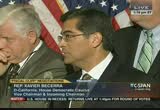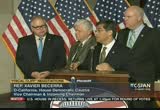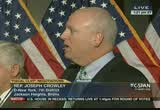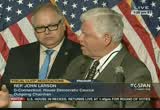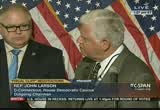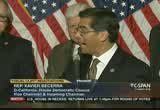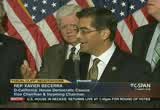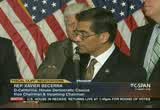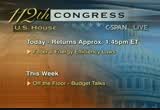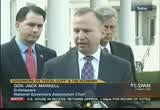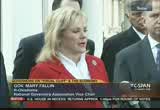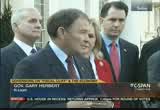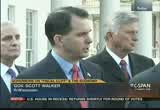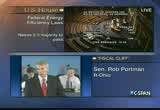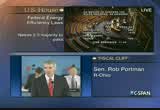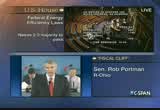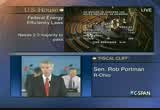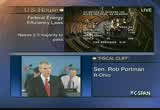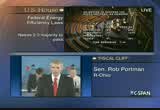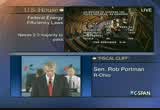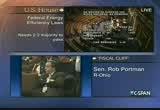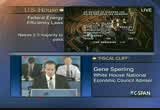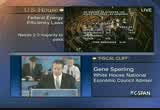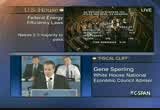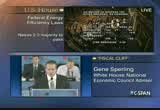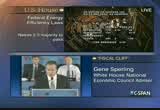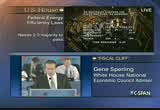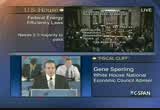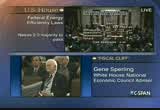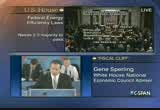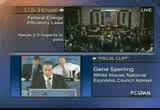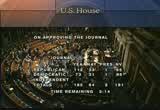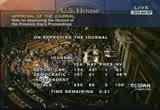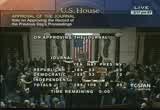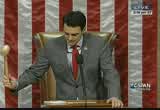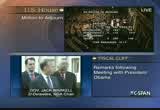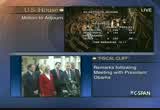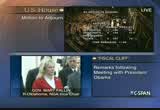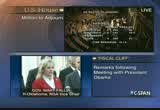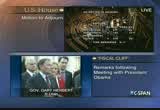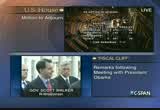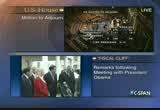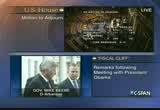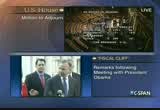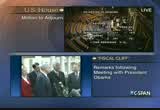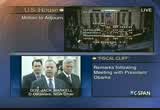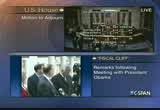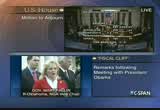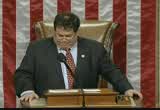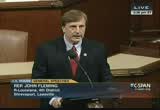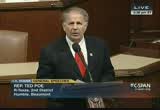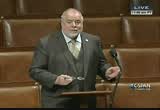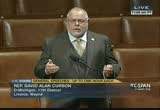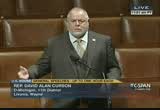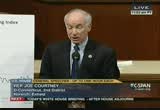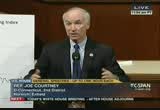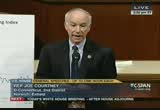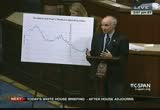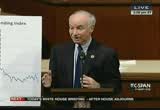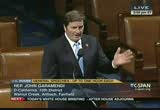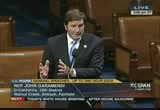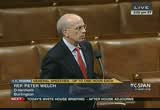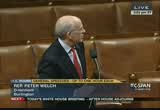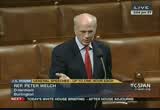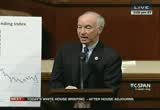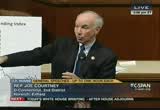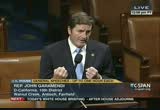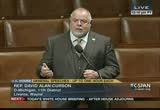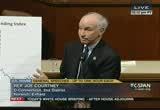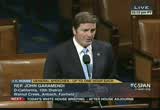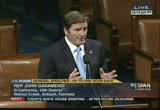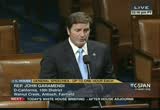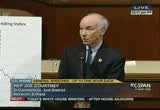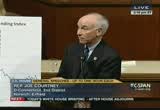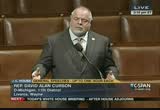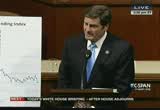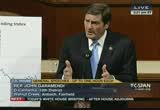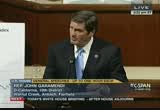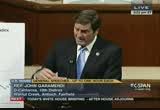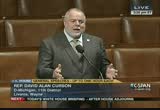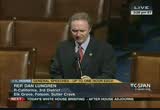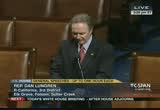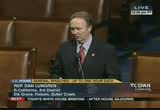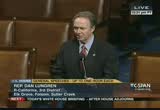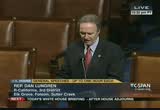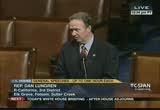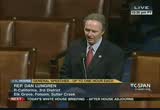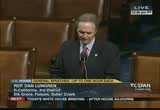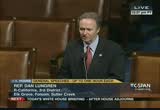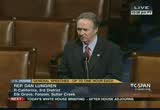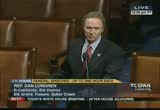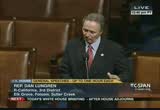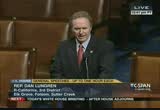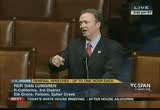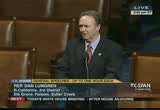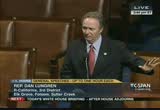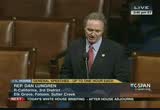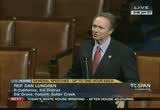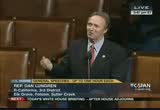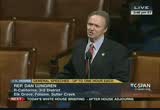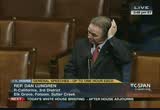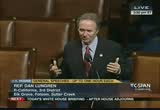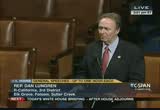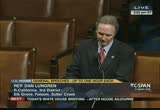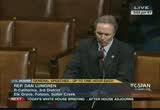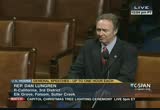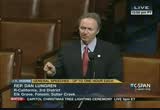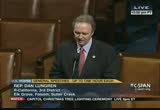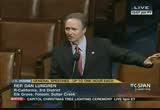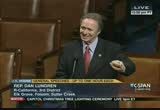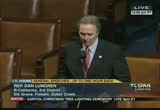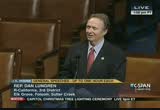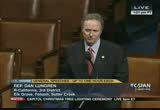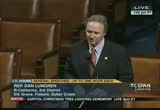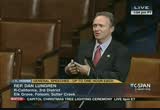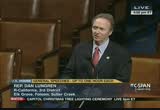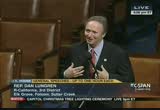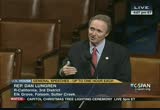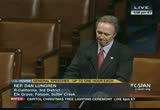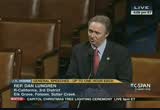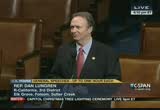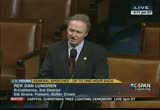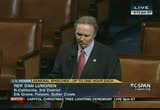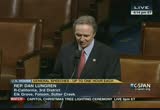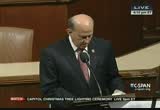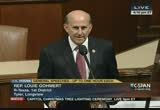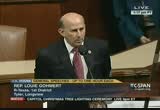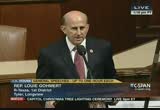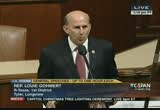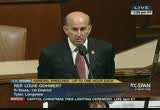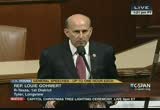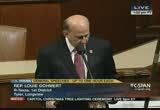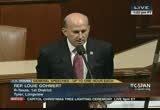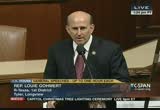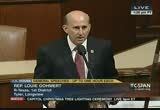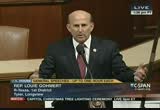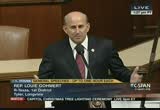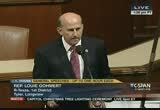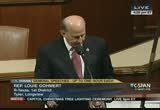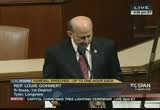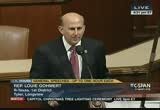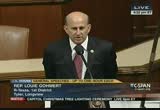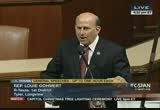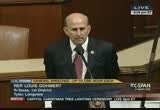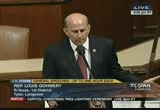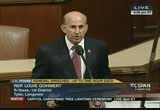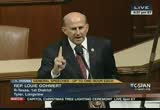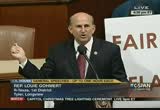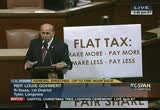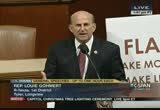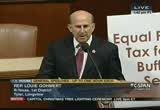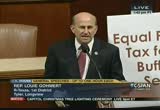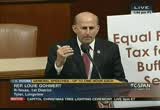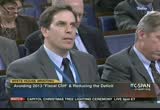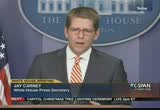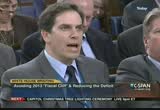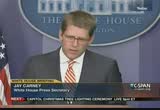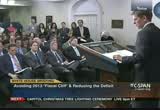tv Public Affairs CSPAN December 4, 2012 1:00pm-5:00pm EST
1:00 pm
larger water heaters are within the scope of the energy policy act and are rated using a thermal efficiency or t.e. rating. the problem facing american manufacturers is that under the current rules of the road only the small water heaters are deemed eligible for the energy star program. this is nonsensical. it's an outdated measure. and disqualifies our large american made water heaters from being covered by the energy star ratings, regardless of how advanced or how highly efficient they may be. . the legislation before us today would provide the necessary regulatory and business certainty that is needed by our manufacturers. this legislation has the potential of adding upwards of 1,000 jobs for domestic water heater manufacturers, many of them are in my home state of tennessee, where there are already 3,000 jobs directly
1:01 pm
involved in the manufacturing of water heaters. i thank the chairman again. i thank mr. aderholt and i also want to commend the gentleman and i yield back the balance of my time. the speaker pro tempore: the gentlelady yields back the balance of her time. the gentleman from kentucky reserves. the gentleman from california continues to reserve. the gentlelady from kentucky is recognized. mr. whitfield: mr. speaker, at this time i would like to recognize for a period of three minutes dr. roe of tennessee who's a member of the education committee, for three minutes. the speaker pro tempore: the gentleman from tennessee is recognized for three minutes. mr. roe: i thank the gentleman, the chairman, for yielding, and, mr. speaker, i rise today in support of h.r. 6582. this legislation would establish a uniform energy efficient descripter for all water heaters, walk-in freezers and walk-in coolers. the legislation also improves the testing methods that determine whether or not these products are energy efficient which will provide certainty for
1:02 pm
manufacturers and their products. in my hometown is one of the largest manufacturers who make up to 8,000 water heaters a day. and this is a real jobs issue in my hometown. these jobs have good retirement plans, health insurance and their competitors are both in canada and mexico and we need to do anything we can to help support these local manufacturers. this bill will make it easier for consumers to compare the energy efficiency of products and eliminate confusion that stems from having more than one type of label. the decision to invest in a large-scale appliance of this nature is a big one. and during these tough economic times, consumers deserve information that's easily understood so they can make well-informed decisions. it's also helpful for manufacturerser to clear guidelines for how products will be judged for energy efficiency. this is why, just to simplify what's going on, to make it easier for our manufacturers, let me tell you, i've walked
1:03 pm
through the plant, been through it. it's absolutely incredible to see a piece of sheet metal, to see our manufacturers take a piece of metal and produce 8,000 water heaters in a single day for consumption in the united states. and i have one in my home, that's what i use. and i have one in my apartment here in washington, d.c., proudly i do. i would encourage support of this and i yield back the balance of my time. the speaker pro tempore: the gentleman from tennessee yields back the balance of his time. the gentleman from california is recognized. mr. waxman: mr. speaker, we have no further requests for speakers on our side of the aisle to support this legislation. i know almost all democrats that i've talked to think it's a good bill. i've urged the others to join with them in supporting it. i think it's a worthwhile piece of legislation. it's a small step but it's a step in the right direction and it will clarify some issues that still need to be clarified. so let's get this done and in pursuit of that objective, i yield back the balance of my time. the speaker pro tempore: the
1:04 pm
gentleman from california yields back the balance of his time. the gentleman from kentucky is recognized. mr. whitfield: i also want to urge everybody to support h.r. 6582, the small, modest energy efficiency bill, that will save some jobs. certainly want to thank the members of the senate, the senate staff, mr. waxman and his committee staff, and certainly the energy and power staff here on the house side for being involved in these negotiations and working this out. and with that, mr. speaker, i would ask for a recorded vote and yield back the balance of my time. the speaker pro tempore: the question is will the house suspend the rules and pass the bill h.r. 6582 as amended. those in favor say aye. those opposed, no. in the opinion of the chair, 2/3 of those voting having responded in the affirmative, the rules are suspended, the bill is passed and without objection the motion to reconsider is laid upon the table. mr. whitfield: i ask for a recorded vote. the speaker pro tempore: the gentleman from tennessee seeks the yeas and nays. the yeas and nays are requested. all those in favor of taking this vote by the yeas and nays will rise and remain standing until counted.
1:05 pm
a sufficient number having arisen, the yeas and nays are ordered. pursuant to clause 8 of rule 20, further proceedings on this question will be postponed. pursuant to clause 12-a of rule 1, the chair declares the house in recess until approximately :45 p >> when the house comes back at 1:45, they'll vote on the bill they just debated, changing federal energy efficiency laws. we'll take you live next to the capital, the chair and co-chair of the democratic caucus, just starting a briefing talking about the fiscal cliff and jobs. it's live here on c-span. >> and continues to preach the kind of message that i think the nation needs, one of compromise but one of assurity that we are going to be looking
1:06 pm
out tore the interest of the middle class and the protection of social security, medicare and medicaid for the people who are in such desperate need of those great programs that are the hallmark of our country. we have repeatedly said and our caucus again just confirmed that job creation equals deficit reduction, and we must put the country back to work. we have proposals that are on the floor. we still believe that even with the -- what little time remains and what little time remains when we're actually working, this is still possible. this is still doable. this is not a democrat or republican issue. republicans believe that america needs to go back to work. it's just a matter of having the will to do it, the programs are out there. compromise can be made around the streamlining of regulations to make sure that we are putting people back to work. if chris christy and barack obama can get -- chris cristie
1:07 pm
and barack obama can get together on that, and i know what's transpired and how the impact of our infrastructure has taken place along the eastern seaboard, it's something we ought to be able to rally around immediately. and of course everyone, everyone deserves a $250,000 tax break. we all agree on that. so why not just simply adopt it and then come back and we'll have time to address the issues as it relates to bending the cost curve on health care and focusing on the vast inefficiencies, the fraud, the abuse and the waste that totals more than $750 billion annually? as for the chairman from my district said, list, it would be a way for us to bring down the deficit but also make
1:08 pm
health care affordable, accessible and functional for the american people. something i believe we must do. with that let me introduce the chair in waiting, javier becerra. >> mr. chairman, thank you very much. it's been a pleasure serving with you as our chairman of the caucus. december, how many families do you know that are sitting down right now trying to do some quick math on their finances and figure out how they can stay on their budget and have a little left over to buy gifts for the kids and for the loved ones so it will be a merry christmas, great holiday for all of america's families? they don't have any choice but to figure out how to squeeze in some money to buy those gifts. failure is not an option for them come the holidays. and on kris day for a lot of families, -- christmas day for a lot of families, you will
1:09 pm
have a lot of kids who want to wake up with bright eyes and ready to enjoy the day. well, if america's families as tight as budgets have been over the last now years for them, can figure out a way to reserve a little bit to make sure it's a great holiday, then we in congress should be able to follow suit. the american people are way ahead of the politicians when it comes to this stuff. failure should not be an option. and we should get the work done that the people expect. now, we're not going to agree on everything. and i believe whether you're a democrat or republican, you would say amen to that. before we get to the holidays, before we get to the end of the year and all these deadlines, then let's at least do what we agree on. as our chairman just said, i think both democrats and republicans alike will agree that we're willing to make sure that for the middle class we let them keep going forward, helping us revive this economy. we don't want to set them back. and so why not do what the
1:10 pm
senate did several months ago in passing a bill bipartisanly that protects the middle class from seeing their taxes raised? we only need a few dozen republicans, quite honestly, to get that done because we're about to sign a discharge petition that we are going to declare as democrats that we are ready to plass the middle class tax protection act which will make sure that middle-class families do not watch their taxes go up simply because republicans are intent on protecting millionaires and billionaires and are holding middle-class families hostage to that increasing tax. we believe we can end december, certainly before the holidays on a really good note, maybe still having some disagreement but at least let's agree that we're not going to let the american people watch congress play this game of chicken right before the holidays where the
1:11 pm
american people are the hostages when we know that we have bipartisan agreement on protecting the middle class. and so we are thrilled that mr. walz has taken the lead on this and i know we're anxious to try to get this going. while we may have disagreements, that should not stop us from moving forward where we both agree bipartisanly. we can get things done. with that let me welcome the incoming vice chairman of the democratic caucus, mr. crowley from new york. >> first -- thank you. i appreciate that round of applause. let me thank both john and javier for including me in this press conference and for welcoming me to the leadership of the house of the democratic caucus. i'm very pleased to be here at this very important moment in time in our nation's history as well. i agree with both john, javier, and i should say as well with tim walz and i won't steal your
1:12 pm
thunder, tim, what you do today is important not only i think for we as a caucus in terms of setting where we are at but i think also a strong message that the american people sent almost a month ago had a they want to see this congress working to get things done. they re-elected the president. the president ran on an agenda of giving a tax break to 98% of the american people, and that opportunity is before us. the senate has worked their will. it's now our opportunity to do that before the holiday season is over. the expression time is fleeting has never been more apropos than it is today. we have very few working days left in this 112th congress to actually act upon what the american people want us to do, and we have even fewer days now that the house republican leadership has reduced the working days this week.
1:13 pm
we can still get this done, but it's going to take an effort to work, as i said before, as the american people want us to do in a bipartisan way to move forward. and i know that we have the opportunity to really accept the agenda straight today, and with that i'll turn it back to the chair, mr. larson. >> well, thank you, joe, and without further ado let me introduce the individual that's spear heading this effort from the great state of minnesota, tim walz, affectionately known in our caucus as a sergeant major and he's got a sergeant major drumbeat to the petition. >> thank you, mr. chairman. javier, i thank you you, and joe, what you do. i represent southern minnesota's first district. it truly is the canary in a coal mine. it's a 50/50 district. it went 50.5% to 49.5 for president obama.
1:14 pm
pretty centrist on issues. very pragmatic. it's farming district. it has the mayo clinic and gunneder lutheran, spear heading reforms there. i tell you what came through loud and clear from the people in southern minnesota, and i would argue across the country was, why don't we try to focus on the politics of the possible we agree on, move on those things and come back later to the things we disagree? this issue of a discharge petition to move forward, this is an issue we all agree on. there's not a single republican who signs this is violating any pledge they took to raise taxes. this is simply going to ensure that we fix that middle-class tax cut, the bulk of consumer spending falls within those people. it provides a certainty that you heard javier talk about during a very important economic time to spend some money during this and i think it sends a strong signal that the kaboogy dances that you have been covering, maybe there's another component of it.
1:15 pm
and it's the 435 individual members who have to go back home, look their constituents in the eye and say, what did you do to make this different. so all we're asking for that folks are going to vote for this. i would argue every single person in the house will vote for this anyway. we know it can be done. the senate knows they already did it. the president said he'd sign it. imagine if this was brought forward, we have an honest debate, we congratulate one another for agreeing on this, we send that signal that we can break this logjam and it's set in stone. i think it changes the conversation going forward. i'm certainly honored to be able to lead this forward. i think it comes out of that kind of a midwest pragmatism that we are all going to compromise for the good. but don't hold up and keep in mind that's 100% of the american public that gets a tax credit on this on their first $250,000. so this isn't excluding anyone. this is the true 100%, and it does the bulk of that, 98% of all taxpayers, 97% of small businesses have that certainty. so i'm going to encourage my colleagues to go sign it.
1:16 pm
i think there's -- i know there's republicans over there that will take a hard look at this, hopefully go over there and do the right thing and move it forward. thank you for that. mr. chairman. >> thank you, tim. questions. >> the republicans would like to see the medicare eligibility age on the table in these negotiations. they've suggested 67. is that something you think democrats could support as part of maybe a bigger deal? do you think it's fair that it's on the table? >> well, i think the president has been very clear and clearly so has our caucus that while we think that everything should be on the table for discussion we do have very deep abiding concerns about where cuts would be made specifically and how fair and balanced it is. and so our criteria, as the president said, is that it's got to be fair and balanced. if it's fair and balanced it's
1:17 pm
-- it should be part of the discussion. as for polling our caucus and terms of where it would be, i would say that that is something that is shall -- will be a big leap for our caucus. >> why is that? >> because i think first of all you have to see the devil is always in the details, and where is the balance? where's the fairness? where's the fairness in the wealthiest .9% still not doing their fair share while we exact that out of people who are in need of medicare and medicaid? so i mean it's a fairness argument. it always has been. and that's what it will continue to be. and we would note that in a number of their proposals -- i thought steny hoyer did a great job of putting forward the
1:18 pm
proposals of the president and the specificity that the president had outlined which is about if you put it on a fwraff would be like this -- graph would be like this and then the republican's proposal's like this. it's a difficult time for the republicans, and we want to provide them with every opportunity that they can -- to save -- not only save face but to come up something which they can do reasonably which is why tim's proposal that everybody agrees with that there be a $250,000 tax cut that this be preserved for everybody. 100% of the people will receive that. not 98%. 100% of the people will received that. so why not go forward with that when we can all agree on it? here's the president's proposal. now it's so small, it's in small print because it's so detailed and so specific. there are the republican
1:19 pm
proposals. now -- >> i just want to point out i can read that. >> so that's our concern. i don't know if the other leaders wanted to -- >> i'll just mention one quick point. i think democrats, as the chairman just said, have always been willing to put everything on the table. we found we reduced the cost of medicare by over $700 billion. we found savings of $700 billion in medicare, so no one should question whether democrats are willing to try to extract savings, reduce the cost of medicare. in fact, a lot of democrats lost their election because republicans went out there and campaigned accusing democrats of cutting medicare and even in this presidential campaign, the president was attacked by mitt romney for having so-called cut medicare. what of course mr. romney forgot to mention is none of those cuts in spending in
1:20 pm
medicare cut benefits. when we did that we made sure that none of the reductions would come at the expense of american seniors who were receiving medicare. and the reason you could do that because there's enough savings to be had. you could get rid of some of the medicare mills, the replication of services and you get a ton of savings. that's what we did. as mr. waleds said, in his district -- walz said, in his district we have a lot of things we can learn from. we're willing to discuss on how to reduce spending on medicare, medicaid and so forth. what we're not willing to discuss in the first instance how you pay for deficits that were caused by things other than these programs. we didn't pay for these two wars in iraq and afghanistan. we didn't pay for the bush tax cuts that went heavily towards the very wealthy. and so why all of a sudden seniors in america should take cuts to their services and benefits they paid for in america and social security so we can drawdown deficits and debt that was caused by other
1:21 pm
things, that's where it has to be explained to us. we'd be willing to listen and we're willing to make reductions in spending in even important programs like medicare and social security and medicaid. >> i don't know if you've been following how this is going. we continue to prover motions to give a middle class tax cut to the middle class. that's what mr. walz's motion -- his discharge motion would do today. they continue to offiscate by bringing new and newer issues to protect the 2% in this country, to divert the discussion from them to other means of savings. and so i would suggest that as mr. becerra said, we have also offered savings that we've seen waste, fraud and abuse within the medicare system that we're willing to discuss. what we want them to do is stop talking about the protection of the wealthiest 2% and talk about giving a tax cut to the
1:22 pm
middle class in this country. >> mr. larson. >> just a final point on that because i do think it has to be said and i said it in my opening remarks because i think mark beralleni got it right. as we're headed towards the opening of an exchange in 2014, that we know that the costs associated with our deficit and getting that under control all relate to bending that curve, and when the rest of the world is at 8% to 9% of gross domestic product that they spend on health care and in many instances offer universal health care and we're at 17% and even with obamacare aren't quite there, isn't it fair for us to look at bending that curve and bringing those costs down? and what we know is this, that if we work together taking a
1:23 pm
republican concept, romneycare, and having exchanges and work to bring to bear on this issue, all of our innovation, all of our technology, all of the great capability and genius of the american people we know we can reduce these costs. the fairness argument is, is it fair to always lead with reducing it on the backs of the beneficiaries as opposed to what the root problem is of the cost and the expense? yes, sir. >> there's been a lot of talk about reducing tax loopholes. stepping aside from the debate whether or not there should be deductions or tax breaks, how do democrats feel about the mortgage interest tax deduction and whether or not that should be talked about or raise revenues by reducing the mortgage interest rate? >> when you look at everything in a comprehensive manner, and
1:24 pm
in the total aspects of tax reform in general, everything should be included on the table. s having said that, this is the backbone of the -- one of the back bones of the middle class. and clearly we support and feel very strongly about sustaining the middle class who use that mortgage deduction and mortgage buildup to for the most part pay for college education as well. >> so you feel that dealing with the mortgage interest deduction would hurt the middle class? >> if you take it in isolation. it depends on what else -- how you balance it off. again, i think the rubric here for us is it's got to be balanced, it's got to be fair, it's got to be comprehensive in this nature. we're certainly willing and think it should be on the table to discuss, but we don't think, you know, that randomly you can pick things out and then without understanding the unintended consequences that that would provide.
1:25 pm
>> mr. chairman, if i could add, i do have a reform on that that -- on the mortgage interest reduction, i have a bill trying to garner some republican support on that takes away the mortgage interest deduction for yachts that count as second homes. it's those types of things that we are talking about. mr. larson was talking about a schoolchildren who is trying to raise a home in mankato, minnesota, and that's coming from the person who represents the land of 10,000 lakes. i don't see any yachts in minnesota. that's the type of reform we're talking about. the thing that mr. larson pointed out, instead of talking about and signing on for that they come to the middle class one. i think that's where the frustration and fairness lies. >> let me ask a question about we heard from you all this morning and also from steny hoyer this morning there needs to be some give and you're willing to give. where does this give come in? you talk about balance and
1:26 pm
fairness. i remember a conference meeting, caucus meeting on the debt ceiling where the administration talked about change c.p.i. and everybody came out of that and said no we are not going to go for that. this seems to be a double down on your position. so where's the give? >> well, first of all, we start with the budget act itself with more than $1 trillion that has been reduced in a very difficult economic recession. we start there, and then we say, ok, we've put a very significant down payment, and during the midst of a recession when democrats in general believe, in general believe that what we ought to be doing is making emormous investments in infrastructure improvement so we can put the country back to work. and so we put the down payment on the cuts. we haven't seen anything by way
1:27 pm
of job creation, which directly impacts deficit reduction. and we've said we've been willing to discuss how we further -- you heard the chairman talk about $750 billion that was taken out of medicare already that the aarp and everybody else recognizes was inefficiencies that can be taken off of the table. we know that in looking at -- and whether you take medical devices, whether you took pharma, insurance, hospitals, doctors, and the trial bar that we ought to be able to bend that curve, and that is on the table. and so what bothers us is that when it comes down to a fairness argument that they start always with our beneficiaries, the people. we're not called the party of the people. we're called that for a specific reason. because that's where we start.
1:28 pm
that's who we care about. and that's where we're going to continue to focus. and we put skin in the game and continue to do so. if you look at the extensive proposal that the president has put forward, you understand that he's serious about this. and he puts this forward at a time when economists are also saying, look, we have to be very careful here that we don't send ourselves back into a recession. and so, listen, i understand ideologically why people who believe that they want to shrink government up so small they can drown it in a bathtub may always lead that way, but it's not in the best interest of the american people in my humble opinion. >> i am going to be measured in my response because you all have an obligation to ask questions. but i hope at some point you all who have heard us on this side and the other side of the
1:29 pm
aisle talking about this will do the math, quite honestly. i can tabulate very quickly for you $3 trillion worth of cuts that have now gone into law that democrats have been there on the tough -- on those tough negotiations. the chairman mentioned $1 trillion that was exacted as a result of the budget control act where the republicans were threatening for the first time have the nation default on its credit if we didn't do something. $1 trillion. that's already taking place, the $1 trillion in cuts. there's another $1.2 trillion that came from the same law, as we know, as the sequester, that also by law will start to take place. that's $2.2 trillion. we talked about the $716 billion that democrats passed without a single republican vote to reduce the amount of spending in medicare without
1:30 pm
damaging beneficiaries' benefits. that's close to $3 trillion. where is the balance on the revenue side? never once did any of those two proposals in the budget control act have any revenues attached to them. and so when you keep coming and asking us, where are the cuts, what are you doing on entitlements, we've been doing it. you all either aren't paying attention or don't wish to ask based on the math. so finally one piece of math. you ask why democrats, who are willing to put everything on the table, are so adamant about social security. in 2013, seniors in america are finally going to get a small cost of living increase in their social security. it's going to average about $21 a month. less for some seniors. a little bit more for most. on average seniors who on average get about $14,000 in social security benefits a year are going to get on average about a $21 increase in their
1:31 pm
benefit to pay for all their medicine, increased cost of their medicine, increased cost of their rent, increased cost of their daily living, $21. republicans are saying in their proposal, we must cut that cost of living increase for america's social security recipients who fade for those benefits. at the same time they're saying, we must cut social security benefits so we can protect the wealthiest 2% of america's wealthiest from incurring any tax rate increase, which would simply take them back to the rates that were in effect in the 1990's when they were making buku bucks and hiring 23 million americans. so social security, it's here for us, because we know what it meant to folks during the 2008 recession when no one was willing to look at their 401-k statement on a monthly basis because they had lost so much of their 401-k or i.r.a. but social security on time, in
1:32 pm
full, paid benefits in 2008. in fact, social security made more money in 2008 than it had to pay out. that final piece of math is this. in the 77 years, chad, since social security has been enacted, how much of you and i and every single american paid into social security? $14 trillion. how much of your parents, my parents, every single american in this country collecting social security taken out of the system, $13 trillion. how much is les? over $1 trillion of hard cash from taxpayers in 77 years is left in social security. so why would you want to cut social security if it's not the successful -- the most successful program that's helped americans in large scale? >> let me play devil's advocate. leader pelosi said you've given these concessions, trillions of dollars in other cuts. does that mean there's not much to give at this point?
1:33 pm
>> absolutely there is. >> ok. >> absolutely. we'll sit down, have a balanced conversation and negotiation on everything, whether it's medicare and all the rest. when the republicans decide they are going to say we have to protect the wealthiest 2% of americans, 98% should not be held hostage to that. let's not just fight and do the kabuki dance. let's at least dispose of the issue we all agree, protect the middle class from that tax rate increase. let's get the work done. we don't need to hold people hostage in america so they can figure out how to have a good holiday. >> the president has included his plan, the idea that extending the tax cuts for a year, is that support you support? >> i think for one the payroll tax cut has put money into the hands of people who need it the most and are putting it right back into our economy.
1:34 pm
eventually what we really need to be talking about is creating an atmosphere for more jobs in america. as mr. larson mentioned earlier, what we need from this congress is an infrastructure bill, one that will put people back to work and contribute furthermore to the growth of this country. we need to be talking about a growth agenda and not simply about patchwork. i think for the moment right now it's something we would certainly support. we have supported and will continue to support to keep money in the hands of people who need it desperately right now. just one other point. i want to make it very clear as javier made clear as well. we continue to be side tracked by issues, take away what we should be talking about and that is that 98% of the people in this country who if we pass the measure by mr. walz that he's offered today would give every american who earns up to $250,000 a tax cut -- >> every american. >> every american, including
1:35 pm
the wealthiest amongst us, and what we have here is being held hostage. that same 98% of americans, clearly by the republican caucus, to protect the very wealthiest in this country from paying -- look. not a fair share. it's what the responsibility of this great state we have. we have to get our ship of state moving in the right direction. we're getting there. but it's going to take cooperation. the american people have spoken. they did it this past november. i know it takes time for things to sink in here. but that did happen. there are consequences to elections. it's time now we act upon what the american people want us to do. that is pass a tax cut for the 98% and for the middle class in this country, all americans, quite frankly, and then get on with the business of actually furthering righting this ship of state. >> what about the argument that the payroll tax cut promises social security, you pay into and get out?
1:36 pm
>> we would not support it if it did that. we made certain that if we were going to do the payroll tax cut that none of the social security moneys that would go into the system would be denied it. and so what we said was what we do with a number of other programs, the general fund replace the moneys that would have gone into the social security trust fund. by the way, in that quick math, $14 trillion minus $13 trillion gfs you $1 trillion of unused social security funds. i didn't include in that social security trust fund moneys the $1.5 trillion that those $1 trillion earned in interest by having sat in treasury bonds for decades. and so you actually have a surplus in the social security trust fund of $2.5 trillion. real money. and so therefore it's available. and none of us believes we should do anything to undermine it. we would never support any tax cut proposal that would undermine social security only if we had a guarantee that the money would be that is
1:37 pm
temporarily left out of social security by reducing the payroll tax only if we know it's replaced by general fund moneys would democrats support the payroll tax cut holiday and in those terms we would support it and we did support it. >> on the discharged petition, how many republicans said they would be willing to sign it? [inaudible] [captioning performed by national captioning institute] [captions copyright national cable satellite corp. 2012] >> the u.s. house will be gaveling back in in a couple of minutes, 1:45 eastern, and will be voting on federal energy efficiency laws. several governors, members of the national governors association are on capitol hill this afternoon discussing the pending tax hikes and budget cuts, what's known as the fiscal cliff. and they're talking about the economy as well with the senate majority leader, harry reid,
1:38 pm
and house speaker, john boehner. this after a 90-minute meeting with president obama at the white house this morning where they called for a quick resolution. the governors spoke to reporters at the white house for 15 minutes after that meeting and we'll show you as much as we can until the house gavels in in just a few minutes. >> well, goorn, everybody. i'm jack, the chair of the national governors association, the governor of delaware, joined by governor fallen of oklahoma, she's the vice chair -- governor fallin of oklahoma, she's the vice chair. the governor of arkansas. we are three democrats and three republicans. we just had what i would say was a very good meeting with the president. we came in part to make sure that the voices and the issues
1:39 pm
that we face as governors in states are heard and considered as part of the discussions going on here in washington. the president was very open to that. said we would continue to have a seat at the table. we talked about some of the issues that we often focus on as gompors. one of those being opportunities for flexibility in terms of some of the programs we partner with the federal government. he was very open to that as well. i believe it was governor walker there's an impact here not only the fiscal issues but in terms of how the discussions here will actually impact the economies back home as well. and the president picked up on that and said he'd be interested in our ideas with respect not just to the fiscal issues but the pro-growth issues. we have a number of followups. the vice president will be really the point person for us going forward, but very much an invitation for us to stay involved. i believe as i say as three
1:40 pm
democrats and three republican, we all agree we were going to come here today to focus on what we have in common which frankly is a lot. i think we all recognize that there's an impact on our states certainly by what happens here and we just want to make sure we as a national governors association and as individual democrats and republicans we are working together. with that i am going to turn it over to the governor from oklahoma. >> thank you and we want to thank the president for speaking on behalf the governors association and the briefing on the economy and some of the discussions going forward here at capitol hill. this is a very serious time for our nation. a very serious time for individual states. especially as we are recovering from the 2008 economic downturn that our nation took and certainly the impact that they had upon our states. we know there are still many
1:41 pm
states in our states that are experiencing budget shortfalls. there are some states that have experienced growth in their economies and are recovering and we know we are still dealing with states that have lower unemployment rates and some have higher unemployment rates. and so we want to be part of the solution to the problems facing our nation, to be able to offer some of the innovative ways we've been able to address some of the concerns that have faced our own state budgets and certainly we understand that the discussions being held about federal cuts, whether it's taxes or tax reform, whether it is spending here on capitol hill or whether sequestration will have an impact on our individual state budgets, and as governors we're preparing our state budgets which i think most of us will introduce january and february as we begin our legislative session, and so we have decisions we have to make.
1:42 pm
so we are hoping as not only the president but as the u.s. congress, the house and the senate finalize and hopefully we'll be able to come to conclusion at the end of this month that we will be included to give our advice, our opinion upon the effects upon public policy and it will affect our budgets. and we have ideas how we can sabe money, how we can be able to create more efficiencies and government and spending with some of the different demonstrations we've done in our various states. we plan on getting back to the president, vice president with some of our suggestions and ideas. so we appreciate their time today. >> so with that why don't we take questions? we're not sort of saying it should be this plan or that plan. what we all agree on is something that ought to get done. and the idea that taxes on so many middle class americans could go up at the beginning of the year if something isn't done is something that could really negatively impact the economies in all of our states.
1:43 pm
with that we're happy to take questions. >> middle class tax rates -- extended now and put off the discussion on tax -- [inaudible] and did you support the president's plan for the tax rates to not go up? >> we are not backing one particular plan or another as i said a moment ago. i'll ask my colleagues to comment additionally. none of us want to see taxes on middle class folks go up. and we think it would have a significantly negative impact on our economy. we're not back in one particular plan or the other. >> absolutely. >> i think what i heard and what we are giving the message today, and we'll give it not only to the white house but we'll give it to congress too, you got to come together and get this done. this impacts the economy. the uncertainty that's out there lingering is creating havoc with our economy in our states.
1:44 pm
and in my particular budget, if they don't get it resolved, it's going to -- not only do we have growth money which we're anticipating in utah which is having a pretty healthy economy, we could take as much as a $500 million loss in revenue streams because not getting it resolved. we'll encourage people to come together on this and get it done. we also are saying that states are willing to do our part. we understand this will be a shared sacrifice as you have to look at spending cuts. states are willing to do more with less. we're asking for more flexibility. it's been a common theme that we talked about with the president, with congress. give us more flexibility, take away some of the strings and we can do more with less, help you balance your budget and keep your economy afloat. >> governor walker, what did you say to the president when you talked about taxes when you were talking about [inaudible] >> well, in our case, as jack and mary both mentioned, we're here not just as individual governors, we're here on behalf
1:45 pm
of all 50 governors the governors association. it is not to support or dismiss a specific plan. as gary mentioned as governors we think it's important we have a seat at the table, we are part of the discussions, both in terms of how it impacts our finances and our economies in each of our respective states. things i talked about is similar to what others talked about. concerns about the economy, concerns about the finances. and really offering up suggestions that we're going to follow up on as an organization, particularly as vice president of the ways that we can highlight things that are good for our finances. but this will be similar to the discussions later with the congressional leadership where governors aren't -- we're not elected to fix all the problems in washington. the president and the members of congress are here to do that. we're here to offer a resource in a way that can help not just our state governments but the people we represent in each of our states. >> the story of wisconsin and how you balanced the budget,
1:46 pm
did he seem receptive to that? >> we talked about this just the other day as an association. we thought it was imperative for us to focus on things that unite us, republican and democrat alike, and so that's what we really focused on. >> the implementation of the president's health care law and how that can impact the possibility on medicare cuts being on the table during the discussions? >> no specific discussion. there was no specific discussion of how the new health plan will affect medicare or will affect the economy. >> we'll take you back live as the house is gaveling in for votes. motion to suspend on h.r. 6582 and approval of the journal each by the yeas and nays. the first electronic vote will be conducted as a 15-minute vote. remaining electronic votes will be conducted as five-minute votes. the unfinished business is the vote on the motion of the gentleman from kentucky, mr. whitfield, to suspend the rules and pass h.r. 6582 on which the yeas and nays are ordered.
1:47 pm
the clerk will report the title of the bill. the clerk: h.r. 6582, a bill to allow for innovations and alternative technologies that meet or exceed desired energy efficiency goals and to make technical corrections to existing federal energy efficiency laws to allow american manufacturers to remain competitive. the speaker pro tempore: the question is will the house suspend the rules and pass the bill as amended. members will record their votes by electronic device. this will be a 15-minute vote. [captioning made possible by the national captioning institute, inc., in cooperation with the united states house of representatives. any use of the closed-captioned coverage of the house proceedings for political or commercial purposes is expressly prohibited by the u.s. house of representatives.]
2:11 pm
the speaker pro tempore: on this vote the yeas are 398. the nays are two. one recorded as present. 2/3 of those voting having responded in the affirmative, the rules are suspended, the bill is passed, and without objection the motion to reconsider is laid upon the table. pursuant to clause 8 of rule 20, the unfinished business is the question on agreg to the speaker's approval of the journal on which the yeas and nays were ordered. the question is on agreeing to the speaker's approval of the journal. members will record their votes
2:12 pm
by electronic device. this will be a five-minute vote. [captioning made possible by the national captioning institute, inc., in cooperation with the united states house of representatives. any use of the closed-captioned coverage of the house proceedings for political or commercial purposes is expressly prohibited by the u.s. house of representatives.]
2:18 pm
the speaker pro tempore: on this vote the yeas are 290. the nays are 106 with two voting present. the journal stands approved. for what purpose does the gentleman from minnesota seek recognition? >> i rise to move to adjourn. the speaker pro tempore: the motion is to adjourn. those in favor say aye. those opposed, no. in the opinion of the chair, the noes have it. mr. ellison: i rise for a recorded vote. the speaker pro tempore: the yeas and nays are requested.
2:19 pm
all those in favor of taking this vote by the yeas and nays will rise and remain standing until counted. those opposed, no. in the opinion of the chair, the ayes have it. members will record their votes by electronic device. [captioning made possible by the national captioning institute, inc., in cooperation with the united states house of representatives. any use of the closed-captioned coverage of the house proceedings for political or commercial purposes is expressly prohibited by the u.s. house of representatives.]
2:35 pm
the motion is not adopted. for what purpose does the gentleman from north carolina seek recognition? >> mr. speaker, i ask unanimous consent that when the house adjourns today it adjourn to meet at 9:00 a.m. tomorrow. the speaker pro tempore: without objection, so ordered. the chair will now entertain requests for one-minute speeches. for what purpose does the gentleman from louisiana seek recognition? without objection.
2:36 pm
>> for two years we have clamored for a balanced approach for raising taxes in exchange for entitlement reform. we must reform entitlements. we know that without reform medicare becomes insolvent in just 10 years. then there's welfare. for the first time -- for the first year ever we spent over $1 trillion on welfare and food stamp usages up now to 15% of the population. mr. fleming: all of this is creating annual trillion dollar deficits which along with the anemic economic growth and stubbornly high unemployment means 23 million americans still have no job. now some republicans say they consider a balanced approach. but how much revenue is gathered from the tax increases proposed by democrats? about $80 million a year. that's barely enough to run washington for eight days.
2:37 pm
mr. speaker, we are less than four weeks from falling off the fiscal cliff. it's time for democrats to come to the table with something more than job-killing taxes. if they have serious ideas for entitlement reform, the american people deserve to hear them. unfortunately, mr. speaker, the reason we haven't heard democrat ideas for entitlement reform may be because they have no plans to cut or reform entitlement spending at all. this is just another game from their playbook. raise taxes and increase spending, as always. i yield back. the speaker pro tempore: the gentleman's time has expired. the house will come to order. the house will come to order. will members please take their conversations off the floor. are there any more "for one minutes? -- for one minutes? any more requests for one minutes?
2:38 pm
the gentleman from texas. without objection. mr. poe: on christmas day most of us will wake up with our families, smell of turkey in the often, homemade apple pie. but on the other side of the world there are men and women who will wake up in the middle of the desert who are representing and protecting america's liberty. those are our great american warriors. in 2005, i went to see our troops in iraq during the christmas season and before i left i asked my staff to get local school kids to make some hand made christmas cards that i could give the troops. it took about 5,000 christmas cards to our troops in iraq, and in kosovo. and every year since then, mr. speaker, kids in southeast texas have been making christmas cards and holiday cards for our troops in afghanistan and iraq and
2:39 pm
other parts of the world. and i want you to know that school children in southeast texas made 69,000 hand made christmas cards for our troops in afghanistan and iraq and other parts of the world that will be taken to them this christmas. i want to thank all those numerous schools, the teachers, and the chambers of commerce in southeast texas. god bless every one of you for helping our men and women overseas have a better connection with our families and our young people in this country. let them know that texans are thinking of them. that's just the way it is. i yield back. i do ask unanimous consent to attach the names of all of the organizations that made cards in this endeavor, mr. speaker. the speaker pro tempore: without objection, so ordered. are there any further one-minute requests? there being none, under the speaker's announced policy of
2:40 pm
january 5, 2011, the gentleman from california, mr. garamendi, is recognized for 60 minutes as the designee of the minority leader. mr. garamendi: mr. speaker, colleagues, and the general public, there's been a lot of discussion in the last several days about what to do with the fiscal cliff. is it a cliff? is it not a cliff? is it it -- is it a slope? is it the end of america as we know it or whatever? but in this debate there are few things that are absolutely critical. tax policy, the president has
2:41 pm
laid out very, very clearly as did the election. we are going to do tax reform. yes, and it's time for those at the upper end of this wealthy country to pay their fair share. and so the president has made it very clear, we are going to raise the rates on those making over $250,000 a year. by the way, we ought to be clear about understanding what that means. that means 100% of americans get a tax break. on the first $250,000 of income. over that, yes, they are going to pay a higher rate, marginal rate for that over the top. but what i really want to talk about today with my colleagues who will be joining me in the next few minutes is another part of this debate. and that is on the reductions in federal expenditures. what's the best way to do it? how are we going to reduce federal expenditures? there are those that say take on the entitlements. make the seniors pay more.
2:42 pm
end medicare as we know it. turn it into a voucher program. or maybe turn it into a premium support program, which as a former insurance commissioner, i know exactly what that means. that means if you're over 65, hey, you're going to get to go buy insurance from the health insurance companies. good luck. premium support, just another way to end medicare as we know it. voucher program, another way to end medicare as we know it. in the last election this was a central part of the debate here in america and it was clear, no way, no how are we going that way. there are others that propose, well, why don't we just raise the age to 67? interesting. very interesting proposal. it will save medicare a little bit of money, but what does it do to those people who are 65 to 67 years of age? it denies them the opportunity to get affordable health
2:43 pm
insurance in the medicare program. and simply throws those people off to the wolves. again to the a pashese health insurance companies. by the way, those are exactly the people that the health insurance companies don't want. they are the people that have higher expenditures. they are the ones that are beginning to get health issues. so the health inshirnse companies don't want them. how are they going to get insurance? are they going to get insurance at a very high cost if at all? by wait, there are those that want to do away with the affordable health care act, in the affordable health care act there is this thing called the patients bill of rights. guarantees that insurance companies cannot deny you based upon a pre-existing condition. however, they can, they can charge differential rates based upon age. so, that notion of somehow saving medicare by keeping people from getting medicare is
2:44 pm
the back way to go. and it is a nonstarter, at least with me and i think many of my colleagues. there are things that can be done in medicare and we ought to talk about those things that we can do here with our colleagues today. we also want to pick up the issue of social security. let's be very clear. the deficit situation faced by the united states is not a social security problem. it is not a social security problem. social security is stand alone. it is not part of the american deficit. it's an issue that over the years has come back before the american public. the congresses in the past have dealt with it, extended the viability of social security for years and years, and this congress does not need to deal with this problem this year or even next year, the 113th congress. down the road it must be dealt with and there are numerous ways it can be, but to bring social security into the deficit debate
2:45 pm
is only to cloud this debate and to make it far more difficult for us to find a solution. now, my democratic colleagues and i and the president have made it very clear, we understand the necessity of solving this problem. we are willing to compromise. and the president has put on the table a very complex, detailed program about how we can deal with the deficit, both in the short term and the years ahead. and we need to proceed with that, unfortunately it was just simply dismissed and a new, actually a rebaked, redone, rehashed proposal put on the table by our republican colleagues yesterday, one that really doesn't move us towards the compromise. we need to get there. . we need to get a compromise under way. i see several of my colleagues here. i'm not sure which one was first up, but it looks like it might be texas. excuse me. florida.
2:46 pm
ms. brown: i'm from florida, and i'm from the home of claude pep per, and he was a -- pepper, and he was mr. social security. and he was here during the time of ronald reagan and he plead sure that social security, which was enacted under the democrats, and i will never forget newt gingrich said he wanted it to wither on the vine. that's been their philosophy. now, i feel that medicaid, medicare and social security is the difference between us and many of the thirled-world countries. in fact, it has been the bedrock of american politics as far as helping to raise the standards. and you know, many of my colleagues often talk about the bible. well, the bible says -- i never
2:47 pm
heard them say let's help the rich. the bible always talks about the poor and what we need to do to help raise the standards. that's what we're supposed to be doing in the people's house. during the campaign, they constantly confused the american people, talking about the $715 billion that was in both proposals that was savings that we put back into the system that helped people that was receiving their prescription drugs. we were helping to lower the costs. in fact, we were plugging the doughnut hole. that argument is over and the fact that it will be 434-1, i will never do anything with social security as we speak. and when you talk about medicare and medicare, many of those people are in nursing
2:48 pm
homes had a cannot speak for themselves. they only have us as their voices, and as we negotiate and discuss, let's look at one group, african-american men. most of them don't live long enough for the benefits. and everything is not equal. when we look at jobs and professions, many of you have these nice cushiony jobs. and so we don't even have to worry about raising the age, but when we look at people that actually work for a living, whether we're talking about bridges or whether we're talking about trains or trucks, you want to raise the limit for them? so there are many issues that need to be discussed as we move forward. but when president clinton was in office, he left this country in the black. the people have weighed in. they've indicated that we want to move forward, we want to put
2:49 pm
people to work but we want to do it in a fair method of doing it. and that is not cutting programs that impacts the working poor in this country. mr. garamendi: well, you're absolutely correct about that. the proposal to cut medicare benefits is a nonstarter. there are things that can be done in medicare to reduce the costs and much has already been done. i'd like to ask my colleague from the great state of michigan to join us, mr. curson is a new member, came in during a special election. welcome. delighted to have you join us. mr. curson: thank you. i agree wholeheartedly with what's been said so far and the testimony, what i really want to say -- into the mic.
2:50 pm
what i really want to say is medicare is run more efficiently than nearly any insurance company in the world. they devote less than 2% of its funding to administrative expenses, and you compare that to a private insurance company that costs up to 40% of premiums for individuals and small group plans for administration and to pay their executives six and seven-figure salaries to do the same thing that'sed a minute straighted by -- that's administered by medicare officials. and the attempts to move medicare eligibility from 65 to 67 sounds like an easy fix. well, not only, as was spoken earlier, the recipients, those people that are 64, 65, 66
2:51 pm
going into that category are people that possibly are already struggling, lost their jobs. they need that health care. they have a pre-existing condition, and now their very life is threatened, having to wait that much longer. and we all look to take care of small business. in private insurance funds such as those type of institutions that money is forecasted to pay for various health care, and you stretch out two more years of their coverage, small businesses now have to pay higher premiums to cover those employees that last those two more years. and they either have to make a choice. they reduce what they give in coverage or they eliminate it altogether or they shift those premium costs to the worker.
2:52 pm
it's happened over and over and over again, and we need to avoid that in this coming legislation. mr. garamendi: mr. curson, thank you so much for your thoughtful discussion of the age issue. it's a profoundly important one, and also bringing up the issue of what is the cost of medicare administration compared to the private health insurance companies. you're quite correct. medicare is a very efficiently run program. very efficient in collecting the money and paying the bills. far more than you'd ever find in the private health insurance sector. perhaps by a factor of three, four, maybe five in some cases. also, medicare has had an extraordinary run of keeping the costs down. i'd like now to call upon to mr. joe courtney of rhode island -- connecticut. i've made two mistakes today about my colleagues' locale.
2:53 pm
joe, it's yours. cortland finnegan thank you, congressman gare -- mr. courtney: i understand that there are states bigger than rhode island and connecticut combined. thank you for taking the time on the floor today to spend some time talking about social security, medicare and medicaid. this really is the moment of truth right now. yesterday the republican leadership came out with their package in terms of trying to deal with the so-called fiscal cliff. even though for months they have not really flushed out with great detail where they wanted to see savings, yesterday they did. they came out with a proposal which talked about waiving the eligibility age for medicare from 65 to 67. they talked about recalculating the cost-of-living adjustment for seniors who are on social security. it's the so-called chained c.p.i. which would lower the year in and year out increase for people on social security in terms of keeping up with the cost of living.
2:54 pm
and these proposals really need a full vigorous debate before the american people before we move in that direction which i would argue and certainly you and others here this afternoon would be the wrong direction for middle class and working family americans. you know, in terms of medicare, i think it's really important historically to review how medicare came into existence. in 1965 when it was signed into law, president lyndon johnson, on the porch of harry truman's house in independence, missouri, half of all americans had any insurance whatsoever. because of age, because of pre-existing condition, because the insurance companies frankly just viewed them as too high a risk and because of costs, only half of america's seniors had any insurance whatsoever. life expectancy in america in 1965 was 70 years old. with that stroke of the pen by lyndon johnson, the genius of medicare was created which created a pool for people above
2:55 pm
the age of 65 and people on disability, a pool which could spread risk out and make the challenge of covering people at that age much more manageable. and for the following 47, 48 years we have had a system which now has brought life expectancy for americans up to age 78. in other words, having people in a situation where they can access, needed medical care in fact lengthened people's lives. in some instances actually added to the economy because some people continued to work to a degree who are on medicare. it is really accomplished its mission which was visualized the day president obama signed it into law. it does face challenges. there's no -- visualized the day president johnson signed it into law. it does face challenges. the way you solve the problem is just make it smarter and more efficient. and when president obama signed the affordable care act in march of 2010, last year there
2:56 pm
were some really solid smart changes that were made to the medicare system to make sure that the cost per patient will be moderated but not that we would cut benefits or kick people off the program which is what the republicans are proposing to do saying people who are 65 and 66 would no longer be eligible under their proposal. on this chart, which i brought along with me this afternoon, is based on standard & poor's, dow jones index which tracks medicare's program every single month in terms of per capita spending. it shows back recently as 2005, 2006, per capita expenditure for medicare was actually quite high. it was over 7% per patient. and that obviously is an unsustainable level under almost any circumstance. but over time it moderated. and then this red line shows the day that president obama signed the affordable care act which put a number of really intelligent changes into medicare, promoting preventive care services, prescription
2:57 pm
drug coverage, making sure people will get their colonoscopies and their cancer screenings and also saying to hospitals, hey, if people show up at their emergency room 30 days after you just treated them, we're going to penalize you. you have to do a better job of monitoring care in the community. and that change by itself is promoting a lot more collaboration on a much more cost-effective better way for people. who wants to be in an emergency room? you want your care to be provided. not sitting in a hospital emergency room waiting for life or death treatment. and so since that date when president obama signed into law the per capita growth rate under medicare is now down to its lowest level in the history of the program. 2% per capita growth. and the fact of the matter is we can do more. we can actually build on that success of the affordable care act. anybody who watched "60 minutes" sunday, they had a story about hospital systems which was basically threatening
2:58 pm
to fire doctors if they didn't admit patients, according to certain quotas, because they're chasing that fee for service incentive that is in old medicare. i mean, those are the kinds of in that case fraud, but in other instances, you know, changing that fee for service incentive can actually put this number down much more dramatically and we don't have to touch a hair on the head of any medicare eligible senior in america for decades to come if we make those smart changes. so the fact of the matter is we've seen great progress just again in the last two years, 2 1/2 years, and the fact is there are very good ideas of ways of making the system much more efficient. i have to tell you and i know the members on the floor will agree with this, when you go and visit a hospital or when you go and visit medical groups, the changes in electronic records, the changes in terms of incentivizing preventive care has been embraced by the medical
2:59 pm
community. they actually understand how wasteful the high-volume fee for service system is in terms of just not only taxpayers but also the resources that are precious and should be really allocated to all americans, not just those who have good insurance who can reimburse for those procedures. so the fact of the matter is we can do far better than kicking 65 and 66-year-olds out of the system as a way of protecting medicare solvency and that should be the direction that we go with these discussions over the financial future of the public finances of this government. and, again, i want to thank mr. fware mendy for -- mr. garamendi for organizing this discussion here today, because it's important to get these facts out. mr. garamendi: mr. courtney from the great state of connecticut, thank you. try is a dramatic one when you consider the period of time and the extraordinary reduction in the inflation rate in medicare. if you had another line on that
3:00 pm
showing the general inflation in health care for the general population, it would actually be above medicare, that entire slope all the way down. significantly above it. so what's happened in part i think you're correct. there may be other forces involved here, but certainly you can see the effect of the affordable care act. and you identified very well some of the critical cost savings that are in that and it's well worth repeating it, which i will do with you and we ought to go back so the public comes to understand what was in the affordable health care act. for those over 65 that are in medicare, those changes are critically important. first of all, stay healthy. save money for hospitals and doctors, stay healthy. so you have an annual wellness visit. i think something like 50 million, 60 million americans have been able to take advantage of that free annual visit. and oh, you got high blood pressure, let's take some blood
3:01 pm
pressure medicine. you have diabetes, here's a program of dietary program, exercise program. we can deal with those. you keep people out of the hospitals. the hospital rate, the other one you talked about, very powerful. i hear from hospitals in my district and i'm sure my colleagues do also. they don't want that readmission because that comes right out of the hospital's pocket and also there's a penalty. so there are many issues that have caused that slope downward to continue. enormous savings to medicare. because when you look at the medicare issue, it's a proks -- it's a projection for 10 years and the projected rate two years ago was like 5%, 6%, and where are you, down in the 2% rate nounge? those are multibillion dollars a year that the american public will not have to pay in taxes and increases in the expenditures. so these things begin to add up. but there are many, many more savings. i don't want to dominate all
3:02 pm
this time. i see that other of our colleagues have come and joined us. i think it's your turn, peter. peter welch from -- i've been missing all the states, would you like to maybe be from alaska or, well, we'll just say vermont. mr. welch: i kind of like vermont but thank you. this is such an important issue about the future, about the future. we can get a deficit deal, the president is committed to doing it. it's got to be balanced. balance means there's got to be revenues, you know, our taxes, especially from the high income, are at historic lows. we have to have health care reform and that can get the cost of health care down. bring that rate of growth of spending down. you know, in vermont that's what we're trying to do. we're a single-payer state. we're trying to move toward a single-payer and the reason is that it's the best way to get our arms around the cost of health care so you can continue the access. and we know that there are
3:03 pm
reforms that we can make in medicare, you know, just for example, if we purchase drugs wholesale, why do we pay retail? in the v.a. and in medicaid, the government is a big purchaser and it negotiates price discounts with the pharmaceutical companies that are quite eager to sell their prescription drugs to medicare -- garmgarm if i might interrupt you -- garmgarm if you might interpret -- mr. garamendi: if i might interrupt you for a moment. it's prevented by law. mr. welch: it's illegal to be a smart shopper. that's exactly right. you can't make that up. it's illegal if you're -- at least like telling you if you went into c.v.s. to buy some aspirin, and you had the option, and you knew you were going to use them for a year, you had a family, if you wanted to buy the bottlele that had 100 -- bottle that had 100 and the preunit price is 1/3 of what it was if you were going to buy the bottle
3:04 pm
of 20, it would be illegal for c.v. -- v.c. -- c.v.s. to be able to sell it to you for a lower price per unit. that's what we have in medicare. so everybody understands you've got to pay for what you're going to get. but the fundamental debate here, and this is what was reflected in the ryan budget with the voucher plan, is are we going to try to address what are obvious failures in the system of the delivery of health care, like not allowing for prescription drug price negotiation? that would save $165 billion. and it wouldn't cut a single benefit. or are we going to allow that system that makes no sense to continue and instead take $165 billion worth of benefits out of medicare so that if you go to the doctor they may treat you for a broken wrist but not a broken forearm? ok, it doesn't make sense. and it certainly doesn't make sense to start talking about benefit cuts before you have the system reforms and can get savings that are literally right
3:05 pm
on the table in front of you. so, we can deal with this debt situation that we have in this country. it is serious. democrats understand that. the president understands it. it's a serious problem. it's a solvable problem. but the -- but to solve it we have to have a significant contribution from revenues, the top 2% can afford to make -- to have their taxes go up to the clinton-year rates. that's number one. and number two, we can have reforms in health care that would benefit not just medicare sustainability but health care expenses whether you get your health care at work through your employer or whether you're a private-pay person. and the nice part of this is that we are all in it together. so, thank you for doing this and we can solve this problem and let's do it. mr. garamendi: mr. welch, we will do it. and, mr. courtney from connecticut has some ideas about other things that we can do. mr. courtney: i think it's
3:06 pm
important. you touched on this. when the affordable care act was passed in march of 2010, the congressional budget office was projecting out some savings because of the a.c.a. but they were figuring about 4% per capita growth, again as you pointed out this chart now shows we're down to 2%. so they've been revising their estimates over the last two years and the net savings, the recalculation just in the last two years has been hundreds of billions of dollars of lower expenditure than they had first thought was going to be the case. when you compare that magnitude of savings with, for example, raising the eligibility age to 67, i mean, they're dwarfed. it is really just a small portion of what efficiencies in the system are capable of producing. and the fact of the matter is that raising the eligibility age, i mean, there's no free lunch. the fact is that even though these are people that willing challenged in the private insurance market, 65 and 66 are still the healthiest population within the medicare pool.
3:07 pm
so the ones who remain in medicare, their part b premiums are going to go up and that's not just me saying it, it's the keiser family foundation who analyzed the impact of raising the age to 67. you're going to raise premiums, you're going to obviously have people in a horrible situation in terms of finding any insurance in the private market. that is the roughest area there, of older, working-age individuals. and the net effect in terms of overall health care costs, in terms of the system, is zero. in fact, there's some that would argue that it would actually add costs. mr. garamendi: i think it would add costs. we discussed earlier that the affordable care act has a very powerful cost-saving mechanism called staying healthy. and that's the prevention programs. if you move that age from 65 to 67, you're going to have a significant population of seniors who will not have access to that preventative medicine
3:08 pm
program. it's not going to be there for them. so the potential for them to develop long-term debilitating diseases increases and when they get to medicare they will be much more expensive, to say nothing of what happens to them during the two-year period had they can't get to medicare. you said something early on. i'm going to go back to this. you talked about what happened before medicare. the 50% of the population of seniors without medical insurance, the poverty rate. and when you said that, my mind flashed back to when i was a young man in the 1950's, actually not even a teenager. my dad took me to the county hospital. we were ranchers out in the boonedocks of california. and -- boondocks of california. and nobody had insurance who was in the senior years. the county hospital sticks in my mind as the reason for medicare.
3:09 pm
it was beyond horrible. there was just a row of beds, the most horrible odor in that ward of people dying. it was so compelling. and today there are issues out there but we have seen the population of seniors healthy, living longer, 20 years longer than they were just 45 years ago. 50 years ago now. this is so important to seniors. and it is the democratic party that has stood for medicare all of these decades. and we're not going to let it go. we're not going to let medicare go. it is a foundation of our humanity and our compassion. as americans for all. because all of us want to live long enough to get into medicare. reforms are possible. we've talked about several of them here today. i know that our colleague from michigan spoke earlier, if you'd
3:10 pm
like to come back in and talk a little bit about this, we'd welcome you. and we'll go back here for a little longer. please, mr. cursen. curse -- mr. curson. gurs mr. curson: again, as we talked earlier, it seems to so many in the public that moving that age, particularly younger americans, that just going from 67 -- or 65 to 67 doesn't mean a lot. well, if you look at the statistics of age in this country, that's the baby boomer generation. that's the greatest population this country's ever had is right in that area. i'm part of that. i'm 64. and so many of my friends cannot wait two more years for health care. they can't afford the out of pocket. some have pre-existing conditions. and without a question, if we move this it will be a sentence of death for many, many americans who won't be able to get the health care that they need.
3:11 pm
as i went through and campaigned, i come from a district that was 60% republican. it didn't matter what form i was in, what group i talked to. nobody, there was no great calling to change social security -- change medicare, to take benefits away, to raise the age. there was a lot of calling to take the corruption out of medicare, to take the phony doctors and the phony bills and the other system, this is what we talked about, not having the ability to negotiate prirpgs drugs. millions and millions and -- prescription drugs. millions and millions and millions of dollars just to make that part of the system competitive. we can't do that by law. that's reridiculous. -- ridiculous. those are things that easily we can go in, we could do and make this system much better without touching a single benefit for any american.
3:12 pm
mr. courtney: you're mentioning about the fact that there may be some young folks out there who may be of the belief that this is really not a big deal, to bump that age up two years, i mean, fact of the matter is that some of the folks who have again analyzed the impact of raising the eligibility age is it would spill over to young americans. and here's how. which is that there are a lot of private employers that have health insurance plans that when people hit retirement age, 65, or they hope for retirement age, they are able to again move into medicare, they come off their employment-based plan, maybe get some supplemental coverage as part of their retirement package. but the fact of the matter is that helps move people out of the work force at the appropriate age of 65 and open up jbs for younger americans -- jobs for younger americans. to the extent that you're now going to say medicare won't be there until age 67, it's going to force more people to stay in the work force longer than i think really most people believe
3:13 pm
would be the case today. so in fact it would create that job lock that would prevent, again, the work force to continue to refresh itself with young americans. so the fact is that having a solid health insurance plan like medicare helps young americans because it again allows the work force to continue to circulate people, older americans out, and younger americans in. and that's why, again, the folks who have the genius to have the strength to pass medicare in 1965, they solved a lot of problems in the u.s. economy, in the u.s. society, that really extended far beyond just the patients who that program covers. mr. garamendi: there certainly is a series of things we know we can do to reduce the cost of medicare. some of those are already in place. they've been brought forward by the affordable care act. others are yet to be done. the prescription drug issue is out there. enormous savings, i think $160 billion, $150 billion right there over a 10-year period.
3:14 pm
the fraud in the system, some of that was dealt with with the affordable care act but there's much more that can be done. there are fraudulent billings for durable medical equipment as well as other kinds of services that are provided. those need to be addressed. the systems that are being put in place, that is moving away from fee for service, will significantly -- we'll significantly address that. and in the area of hospitalization, again, there are programs that are viable, that are not yet implemented, that are not part of the savings that have already been calculated. for example, programs on the dual eligibles. the dual eligibles are those that are -- that do not have sufficient income, that are already quite ill, that may be 20 years of age. and they're getting medicaid as well as medicare. there are savings that can be found in the way in which we organize that. for those seniors that are in
3:15 pm
medicare and organized health care system that keeps them healthy, that is taking the prevention program a step further or two or three steps further, so that there's a continuity of care, and there is a follow-up, maybe a social worker, simply s somebody on the phone saying -- simply somebody on the phone saying, how are you doing? are you able to take your medicine? are you able to get the food that you need? so people can stay healthy. healthy population, significantly reduces cost. the use of the affordable care act, not just for medicare, but for the total cost of the system, has very, very powerful cost reduction in it and it's called insurance. 40 million americans are going to be insured. that means that those people are less likely, far less likely to go to the emergency room to get their care. the affordable care act also provides for clinics where a private doctor may not be available, a clinic would be
3:16 pm
available. so all of these things provide more care to people and in doing so reduce the cost of the extraordinary expensive care that comes from when people don't get continuing services of health care. so medicare is a huge issue before all of us. on the democratic side we're saying, yes, there are savings available in medicare. we should take advantage of those, but we're not going to cut benefits and we're not going to privatize medicare or end medicare as we know it. there are other things that we can do, we're willing to do, let's compromise on those things that make sense without destroying the medicare program. not on our watch are we going to see the benefit package reduced in such a way that harms seniors. in no way. and in no way are we going to end medicare as we no it. we'll draw a line in the sand. we'll save the money. we'll put that cost curve even on a better trajectory, and that is a very, very formidable
3:17 pm
and positive trajectory there. i will spend a moment of time as we come towards the end of our time on social security, which many people -- well, not on our -- not on the democratic side. let's talk about social security and should it be on the cutting table here, should it be part of the deficit reduction. mr. courtney: what's remarkable, and i know many of you are well aware, social security over the last three, four years, two out of those last four years there was no cola. there was 0% increase for seniors on social security. again, as we all know, it's a formula that's tied to labor department basket of goods that they spit out every year since 1970's when cola was first enacted. and where the economy was at that point produced that result. now the last two years there have been moderate increases through the cola formula. again, the republicans want to go deeper. they want to come out with a
3:18 pm
new mr. cole: adjustment called the chained -- with a new cost-of-living adjustment called the c.p.i. and make that even lower for seniors. you know, as i think many of you know, you go to a senior center and say, how come we didn't get a cola this year or how come it's so small, you explain the formula. the fact is that labor department formula that we have today uses a lot of goods and services that seniors don't buy. they don't buy flat screen tv's. they don't buy laptop computers. prices have come down because of competition in those areas. they concentrate their area on food and fuel and prescription drugs. if you look at that basket of goods, the cola would be higher than the existing formula and certainly not lower. and so, you know, for the republicans to come out with a proposal that says we should depress the cola formula we have today that again really
3:19 pm
doesn't match up with the profile of what a senior goes out to the supermarket and buys one week to the next is really going backwards in terms of really the economic security of people over age 65. i know the gentleman would like to share his thoughts from michigan. >> and i think -- mr. curson: social security is not funded by tax dollars. the confusion lies because over the years the contributions by workers to fund social security created a surplus. with that surplus, they loaned that surplus to other government funding projects, and they're being paid back with government money. and that government money every year is now playing in to the repayment. and that's why people think that you can cut social security to take the tax
3:20 pm
dollars out. well, if it was a private insurance company that had that surplus and loaned that surplus to another company, that first company would expect the second company to pay it back. so that cannot part of this equation. social security and the federal money that goes into social security cannot be part of the equation in this fiscal cliff debate. certainly with the expected theme of social security surviving before 2038 before it has reduced benefits, in the very near future, this hall, this great hall has to discuss how to fix that and other great minds in this hall i'm sure can, but it does not need to be part of this debate. this does not have to be a -- it should not be a part of whatever legislation we settle in this last lame-duck session of this congress. mr. garamendi: you're certainly well stating my position and i believe the position of our
3:21 pm
colleagues and i believe the president. social security is not part of the current deficit problem. it is an issue. we'll have to do with it anytime between now and the next seven, eight years and we can and it's been done before. at least three times in my memory social security has been adjusted. one was discussed earlier with the issue of the cola. that's been adjusted. there are things that can be done to deal with social security. but that is the debate separate and apart from the deficit and the fiscal cliff debate. fiscal cliff debate is a tax issue and it's also a spending issue. today we focus largely on the issue of what are we going to do about medicare, a big part of the federal expenditures, an argument is this. we're here to protect medicare for seniors. period. we're not going -- we're not here to cut the benefits for seniors. we're here to see to it that medicare, which has been a program for seniors since 1964,
3:22 pm
1965, is going to continue to be there for seniors and the benefits package there. there is changes that can be made to reduce the cost of medicare but not to reduce the benefits. we talked about many of those. and so here's where we're coming. within that area there are very, very significant savings that can be done. the prescription drug benefit. $150 billion over 10 years. other issues having to deal with keeping people healthy to extend their health care. issues having to deal with how much we pay for certain services. fraud and abuse. all of those things could add up to the potential savings -- not to the potential -- to the saving that the president has called for which is somewhere in the range of $300 billion over 10 years, additional savings over and above what has already taken place in the affordable care act, and we've seen in this decline in the inflation rate in health care some of the effects of the affordable care act. so there are things that can be
3:23 pm
done and will be done. social security not part of this debate. but i also want to point out here in the last clothesing minutes of this a couple -- closing minutes of this a couple of things which i think is important. the president put forward a very detailed program calling for $1.6 trillion in additional revenue over 10 years. and that is money that is to come from the expiration of the george w. bush tax cuts for the top 2%. now, i want to make this clear. i said this earlier as it's worth repeating because it's not said very often. every american taxpayer gets a tax reduction. the superwealthy to the very minimum taxpayer in this nation gets a reduction in what the president is proposing and that is to continue the current tax rate on those under $250,000, adjusted gross income. for those who have income over and above that, they get that
3:24 pm
tax reduction and above that they are going to pay an additional amount up to 3.9% in two different traunches. so everyone gets a tax break, but those superwealthy, the 2%, they're going to pay for and that will amount to a substantial amount of money over 10 years and frankly they've had 12 years of really low, low taxes, the lowest taxes really ever since the 1930's. the president has also proposed something that's very important. we talked about this last week. i want to talk about this again the next time we come here and that is, how do we grow jobs, how do we put people back to work? the president has proposed an additional $50 billion. he did this more than a year ago in the american jobs act. and he's put it back on the table. $50 billion of infrastructure. let's build the foundation. that deserves a lot of discussion and frankly it's something we ought to enact here right away and put people
3:25 pm
back to work. and there are other savings that he's proposed over the course of the next two years. we don't have time now. i noticed our time has just about expired. you want to take a final shot at this, mr. curson? this is the first opportunity i've had to spend part of my hour with you. you're a very articulate spokesperson for the working men and women in this nation. you know the issues of medicare and social security so very, very well. and i know coming from michigan and detroit you know the need to mr. the job portion of our -- need to build the job portion of our economy. mr. curson: i thank you for that and i thank you for your comments. without a doubt we could take an hour talking about rebuilding the infrastructure, the jobs it would create, the need in america to do our bridges and our roads. if you're about to drive over a bridge, you want it safe. it doesn't matter if you're a republican or a democrat, you
3:26 pm
want that bridge to hold you and your car up as you go over it. that needs to be done. much of our infrastructure is crumbling. the power grid is crumbling. the grid goes out, it doesn't matter what party you are on, you want your refrigerator to work, you want your house on. all of those things that could be done and put america back to work and create revenue from people working, when they get that paycheck, then they have money to send their kid to a dance class or to go get a haircut. all the small business in the area spraun off of that money from -- sprawn off of that money. that should be on the forefront of our agenda and i hopefully have a chance to talk about that. mr. garamendi: how about next week? we pick up the issues of infrastructure and jobs alike. this week we need to focus on what has been put on the table by the republicans and the democrats on how to deal with the fiscal cliff dealing with the issue of social security
3:27 pm
and medicare. social security, no, not part of this problem. something we'll deal with perhaps in the next congress or even in the one beyond that because we do have time to deal with social security. medicare, for those who want to privatize medicare, end it as we know it with a voucher or premium support program, no, no how are we going to go there. for those who want to work on changing the way in which medicare operates, to get saving such as drug -- negotiating drug prices, dealing with fraud and abuse, the various payment systems that are in medicare, all of which can save money and to continue, continue the work of the affordable health care act in the way it has already brought the inflation rate from the 4% to 5% down to the 2%, 2.5% range, this is an extraordinary savings right here and that will be calculated in the years ahead. this will add up to tens -- frankly, this will add up to hundreds of billions of dollars
3:28 pm
in the reduction in the projected cost of medicare in the years ahead. so we are making progress. we got work to do and we're prepared to do it. the democrats are prepared to put together a compromise. let's get to work on it. the american public expects us to do that, and we can and we will. with that, mr. speaker, i yield back. thank you. the speaker pro tempore: the gentleman yields back. under the speaker's announced policy of january 5, 2011, the chair recognizes the gentleman from california, mr. lungren, is recognized for one hour. as the designee of the majority leader. mr. lungren: thank you very much, mr. speaker. i will talk about an issue that is of utmost importance to this country, one i have worked on for several decades and one has an urgency to it that cannot be denied and had a is the issue
3:29 pm
of immigration. it is a multifaceted issue, one that has a number of subtext to it, but nonetheless is one that will not be confronted. the challenges will not be met unless or until we recognize the problem or the challenges as they truly exist. what i mean by that is this. immigration in all its aspects is a part of the heritage of this country. immigration is the cornerstone -- one of the cornerstones of this nation. it has been said, and i think it is true, that this is a nation of immigrants americans, trace our ancestry to some foreign country, some foreign shore.
3:30 pm
the rate of immigration has gone up and down over the two-plus centuries of existence of this country. it has varied in terms of where the greatest numbers come from over the centuries. it has resulted from and has been altered by decisions made by previous congresses and presidents in terms of the laws that prevail with respect to immigration. but the fact of the matter is that we now are facing a question of immigration policy that has not in fact worked for some period of time, to the extent that is necessary. there are several aspects of it,
3:31 pm
as i mentioned before. someone the area of legal immigration. this country has a glorious history in terms of inviting and accepting and embracing peoples from all over the world. i think i can say without contradiction that this country has had the most open policy with respect to immigration over the years of any country in the world. we had restrictions at times. some that, as we look back now, appear to have before at least misguided. we have had some discriminatory practices in the past with respect to people from certain parts of the world, certain parts of asia at times. there was in fact a bias, if you will, towards europe and
3:32 pm
particularly western europe over a number of years. but in the 1960's there was a decision made in this country by way of our laws that moved us towards a worldwide quota system. meaning that the chances for peoples around the world were to be in some ways viewed as equal. meaning that we did not have a bias toward europe, we did not have a bias toward some other part of the world. the idea was that we would try and make our immigration policy work such that someone who wished to come to the united states from a country in africa or a country in asia would have a similar chance as existed for someone in europe. so that was a major change in our overall policy. when i came to congress in 1979
3:33 pm
that was essentially where we were. but we also realized that there had been a lack of enforcement of the laws with respect to legal immigration, such that we had a significant number of people who would come to the united states without the benefit of papers or who had come into this country illegally or had overstayed their legal status in this country and were now here illegally. now one of the consequences of a lack of proper enforcement, one of the consequences of having large-scale immigration is that it overrides in a significant way the law that would look out and say, no matter where you're from in the world, would you have approximatelyy an equal
3:34 pm
chance of coming into the united states. and if you had illegal immigration from particular areas of the country, that would in a sense create a bias under the practice, if not the actual law, for that part of the world. we found, interestingly enough, that the largest number of people who had come into this country or were in this country without proper documentation came from central and south america. the largest number of them from a single country, that is mexico. which is not altogether surprising when you realize we have a common border with mexico that ranges from the gulf of mexico to the pacific coast, it is approximately 1,960 miles long. and if you have visited, if you have traveled along the entire length, as i did back in the early 1980's as a member of the immigration subcommittee, you will find the topography sets that it is difficult at times to actually have a border that is marked and a border that is
3:35 pm
controlled. nonetheless, that does not excuse us for not exercising the control that we should have. because of the fact that we had this dilemma of a large number of people who had come to this country illegally, and at the same time we were attempting to enforce the law such that a worldwide quota system would still in fact be worked, in the 1980's, there was an effort to try to reform our immigration laws. i was a part of that, as a member of the immigration subcommittee. we were, as republicans in the minority at the time, so as the top republican on the subcommittee i was not the chairman, i was in fact the ranking member. i am pleased to say that at that time i had a great working relationship with the then chairman of the subcommittee, a
3:36 pm
democrat from louisville, kentucky. perhaps the fact that we both were graduates from the university of notre dame and shared an affinity for our alma mater assisted us in working closer together. and also, coincidentally, there had been a commission established to look into immigration, a bipartisan commission established in the first instance by president carter and continued on by president ronald reagan, and it it was co-chaired -- and it was co-chaired by the former president of the university of notre dame, a person much admired and someone that i had known for most of my life. and in a very interesting way we worked together, acknowledging the proper roles of the commission and the congress and shared information and i think shared the same hope that we
3:37 pm
could come up with legislation that would reform our laws. in 1984 we passed a immigration reform law here in the house of representatives and there was a similar law passed in the united states senate. there was a call for a conference and in a practice that is somewhat different from that you observed today in the congress, at least for the last several congresses, at that time you actually had a physical conference where you had members from the senate and the house representing those two sides of the capitol meeting in public session, attempting to try and work out a conference report. i recall meeting in a large room where the table, as it was set up, was very large to
3:38 pm
accommodate all the members of the house and all the members of the senate who were there attempting to try and deal with the issue, and our staffs assisting us. and we spent i think actually an entire month in conference attempting to work out a conference report. we were unsuccessful. we came back in 1985, in the new congress, and began working. both in the senate and the house. and at that time the name of the bill, the common name of the bill changed from the old name to the new name. and i recall being at this position on the floor of the house when this was the minority leadership table, being the republican floor manager of the
3:39 pm
bill. we spent well over a week on the floor debating. as i recall we had well over 200 amendments that were in order. most of which actually got debate on the floor of the house. and there was consideration of issues, some issues within the overall issue of immigration reform that i think went from liberal to conservative, from issues of legal immigration to illegal immigration, agricultural work, seasonal workers, just about everything was considered on this floor in an almost totally open debate. i was proud to be a part of that debate. i was proud to have garnered the sufficient number of votes on the republican side to join with
3:40 pm
those on the democratic side so that we'd pass that bill. we went to conference, we completed action on that, we sent the bill to the president and i can recall driving back to the residence i had here in this area on an afternoon when i was listening to the radio and hearing the report that president reagan or the white house had announced that president reagan was going to sign the bill. i almost drove off the road at that time. i recall that i had worked with the administration but it was not a perfect bill. i've never found a perfect bill here. and there were many naysayers and so you were never sure until the president made the decision that he would sign it. and i was pleased to be at the white house when the president signed that bill. it was a true compromise. it did result in the largest legalization that we'd ever had in the united states. i don't believe it was a total
3:41 pm
amnesty, i would reject that notion. but it was in fact a legalization. but the genius of that compromise was that there would be legalization on the one hand and there would be enhanced enforcement going forward on the other. and if one would look at the reports of illegal immigration that followed the signing of that bill into law by president ronald reagan, one would see an interesting thing. the numbers coming across our southern border dramatically dropped immediately after that law was passed. in large measure because of the belief that the -- belief that, the widely held belief that in fact we would enforce the law. and there was enhanced enforcement. and we were going to be serious about it.
3:42 pm
and i haven't look at those numbers in a long time but it seems to me, as i recall, that for a period of maybe 12 to 18 months we saw significant -- a significant drop in illegal immigration or illegal migration into this country. and then it became evident that enforcement was going to be slow if at all. and the fact of the matter is there was not enforcement. there was not enhanced enforcement, there wasn't enforcement, there wasn't a serious effort. and that was a combined result of of a failure to follow through on the part of the congresses and administrations. so as a result, after a significant drop for a short period of time following the passage and signing into law of the bill, we saw a ratcheting up of illegal immigration in this country. and that was in 1986.
3:43 pm
so fastforward to the present time. we have had the result of that ratcheting up of illegal immigration into this country. we have had a situation in which , since people saw that we weren't going to enforce the law, there was an encouragement in essence to come to this country any way you could. and there was, as the sociologists call, the magnet that caused people to come to this country or invited people to come to this country or attracted people to come to this country and that magnet, otherwise known by sociologists as the pull factor, was called the prospect of jobs. i had argued on the floor of this house back in the 1980's that in fact we had to recognize the reality of the reliance of american agriculture on foreign workers, to a significant
3:44 pm
degree. now i'd come from the southwest, i'd come from southern california, i had seen that close up. i had gone to the fields, i'd seen the conditions in which people would live just for the possibility of coming to the united states for a job. i had seen that since we didn't control it in a fashion that the government actually determined, we, the people, through our government, determined the number of folks, the number of jobs that would be available, determined who would come in, how long they would stay, under which circumstances they would work, and what areas of the country they would work. because we didn't do that it happened anyway without any controls whatsoever and the problem was exacerbated. one of the fundamental changes i've seen or differences that i've observed being in the congress this last eight years as opposed to the 10 years i was from 1979 to 1989 is that the problem, as i saw it in the southwest, is not nearly
3:45 pm
confined to the southwest now. it is in fact a national problem. you will find the presence of those who are here illegally working in agriculture all over this country. you will see the increase in seasonal work because you'll see the increase in the demand for quote-unquote local produce, locally grown crops. and as you see that, you see the demand for seasonal agricultural workers expanding to other parts of the country. and we don't control it. we don't have a workable system . some people say, well, we have the guest worker program at the labor department. the h-2 grant. it frankly doesn't work. it works for about 4% of the
3:46 pm
agriculture industry in the united states. i say that as someone that drafted the legislation as part of simpson-masdemroley, not because i thought it was the best we could do but it was the best that could be accomplished in any legislation that was going forward. and so we are now confronted with a situation in which we have had large-scale illegal immigration into this country after the passage of simpson-mazolli and the failure to enforce the -- well, the failure to implement the enforcement side of that. we are also confronted with the question of legal immigration and the fact that right now we set aside too many visas. i am not in any way denigrated unskilled workers and those who
3:47 pm
come without skills and then develop them once they are here. our history is replete with those who have accomplished great things. having come to this country with nothing more than a desire to do well, a commitment to hard work and using the intelligence and the other skills -- skill capacity given by god. it makes no sense in which we have a situation which we take peoples from around the world who come to this country because we have the greatest colleges in the world and who develop expertise in science, technology, engineering, mathematics, in areas that might have an immediate impact on some of the most important growth industries as we look to the future. when we say to them, if you get your degree here, you got to go to your home country for several years and then apply to come back to this country in
3:48 pm
order to work here, but canada will allow you right away. other countries will allow you right away. or go back to your own country and compete with the united states economy and your emerging economic fwrothe in your home country. i saw this very, very closely at hand when i saw one of our major technology companies actually build a plant just over the border in canada, utilizing a core of those people who had graduated from american colleges, had come from foreign countries and were immediately accepted into canada and then canada was able to build a work force of about 1,000 people around a core of probably no more than 100 people that would have been required to go back to their own countries from the united states. they basically said, hey, you don't have to go there. you can come to canada,
3:49 pm
witnessed' lost the potential of 1,000 jobs going across the border because of a policy which doesn't fully understand the appropriateness of us matching up with those people who have particular skills and wish to come to this country or stay in this country after they've been trained in this country and their skills and our needs. in some ways -- now we did vote on the stem act here this past week which was one attempt at dealing with that question but only one attempt at dealing with that question. in some ways, in my judgment, the changes we need to make in legal immigration have been -- i don't know if i'd use the term held hostage, but they certainly have been put on the back burner because of the desire for us to deal with a true problem that is more
3:50 pm
prominent and that is illegal immigration. so why am i talking about this? well, i'm not going to have a chance to work on this after january 2. while i devoutly desired the opportunity to do that, there has opinion a decision to be made otherwise. and i still have the passion for dealing with this issue because i think it's so important to this nation. i think it goes to the identity of this country and i think it goes to the future of this country. and i reject the notion had a we either have to be a nation of immigrants or a nation of laws. i think we can be both a nation that welcomes immigrants and a nation of laws. i think we have to understand that there is nothing wrong with this country as a sovereign nation making decisions with respect to immigration law that are in the best interest of america. sometimes i think when we're talking about international
3:51 pm
law, we talk about working with the united nations, we talk about working with other peoples of the world, we lose sight of the fact that the first obligation of the federal government is to have the interest of the people of this country at heart, that the obligation of the state department, for instance, is to represent the national interest of the united states. and so i make no apologies for the united states asserting that it has a right to make decisions in the area of immigration that are in the best interest of the united states. i guess the tough question is, what is the best interest of the united states? again, i would say to show that we can be both a nation of immigrants and a nation of laws. so i don't use comprehensive immigration reform because that's been a watch word or a watch phrase for amnesty. and i understand that. i avoid using the term pathway
3:52 pm
to citizenship for those who have been here illegally because that in fact is defined azzam nesty and for a good reason in many circumstances. -- as amnesty for a good reason in many circumstances. i think we need to have a response for a multifaceted problem. so first, in order to gain the confidence of the american people, we have to admit that when we did the last major immigration reform -- we had some bills since then, but i'm talking about the major immigration, simpson-maz sflmbings oli, we did have the complementation side of it. the american people understand that. they think they were shortchanged. i think they were shortchanged. we have to admit that readily. that's the context in which we have to deal with the issue. i think we have to therefore accept it, acknowledge it and learn from those mistakes. so we need to have a commitment towards ens forcement.
3:53 pm
we need to have borders -- towards enforcement. we need to have borders that are controlled because of the threat in an asymmetric -- in a period of asymmetric warfare or an asymmetric threat where those who are committed to do us harm are not just nation states but maybe transnational terrorist organizations or maybe or lone wolves who are inspired by and committed to the values that have been expressed by those terrorist organizations who spread their venom around the world seeing who might be attracted to it. and if in fact we have a situation like that, you ought to be even more cautious than before than those entering into this country with terrorist
3:54 pm
thoughts and terrorist desires against this country. so for any number of reasons, we need to have a commitment to controlling our borders, number one. number two, we have to acknowledge that one of the magnets or one of the pull factors causing people to come to the united states or inviting people to come to the united states is the prospect of employment that does not consider the legal status of those who seek that employment and so that's why i think an everify system or something like that has to be part of what we do. third, we have to acknowledge that in the area of agriculture there is a proven need for foreign workers and people that argue about it but i would just say look at the example in the
3:55 pm
state of california, my home state. we've seen that for well over 100 years we've relied greatly on foreign workers for agriculture and they've been legal or illegal depending on whether or not we've had a program. i have for many years looked back at the program to see both its positives and its negatives. its positives were basically categorized as a government-sponsored regulated program that allowed people to come to this country to seek work in the area of agriculture and give them a legal status while they did. that's the benefit. that's the positive. the negatives are that in many ways there weren't protections for the workers, and because one who came under the program was tied to a specific workers, if he or she had a complaint about that particular employer that if he or she had a complaint about that employer,
3:56 pm
they often found themselves back in their home country before they had any adjudication of that complaint. so i think you have to devise a program that would determine the number of people who come here, determine what circumstances they come here, determine what areas of the country they can be here, but in a sense allow them to be free market -- free players in a free market that is he defined by the job. that is agriculture. and particularly because of the seasonal worker nature of much of agriculture, that they engage in, to allow to go from employer to employer. there are enforcement mechanisms you can put in place to make sure they stay in agriculture and there are significant penalties that you can apply if they fail to get a job or get a job in agriculture . one of the things in a i've had as part of any proposal that i
3:57 pm
presented is that you take the amount of money that would go into social security, the employer and the employee contribution, and that goes into a fund that first is responsible for paying for the administration of the program so there's no burden to the taxpayer. secondly, that money would go into a fund that would pay for any costs incurred by local jurisdictions for emergency medical care that was rendered to those individuals. and third, that which would be remaining would go into a fund that would -- that is for the contribution by the employer and employee for that particular individual, be dedicated to that individual but would be redeemable only if they returned to their home country and were physically present there. if they weren't during the period of time of time they were supposed to be -- period of time they were supposed to be home, they would not have that fund. that money would be forfeited. if they did they would be able
3:58 pm
to redeem that money back in their home country. my idea would be they would be able to work in this country 10 months out of any calendar year, and they would be able to go back and forth during that period of time. one of the things we discovered is as we have increased our ability to enforce our control of the border, if someone successfully gets across the border and works in the united states, they now have a great incentive not to return home for failure they won't be able to make it back. so in a very perverse way, the very success of our increased enforcement has made it more likely that they will stay here permanently rather than return home. so we need to develop a program that is based on the facts as they exist. and participation in the program doesn't put them on the road to citizenship. doesn't grant them any rights
3:59 pm
to citizenship or permanent resident status. it's a worker program. i don't think that any industries have proven the case that they need those kind of foreign workers. i really don't. in terms of construction, for goodness sakes, why do we have the high unemployment rate among african-americans in this country and among hispanics who are here legally in this country when the construction trade is a great trade to learn, is a wonderful way to be able to earn one's living and has an opportunity for people to move from just someone working at the jobsite up to learning their trade and becoming a contractor, subcontractor in some ways? so i would not suggest that we expand the guest worker program that i'm suggesting beyond agriculture, but i do believe it is appropriate in the area of agriculture.
4:00 pm
probably the most difficult thing to deal with in this entire arena is the question of those who have been here for a substantial period of time in illegal status, illegal immigrants that have been here for a long period of time, those that have put down roots in the community. and there are those who say, look, the best way to do it is take care of the program by putting them on the road to citizenship, and there are those who have suggested things such as voluntary departure or enforcement of some other mechanism. and while i appreciate the sincerity and the thinking that goes into both those positions, my belief after being involved in this for over 30 years is that neither one of those positions is going to ultimately succeed. so what do we do? in baseball we have something, you know, when you pitch a ball -- a ball is pitched to the batter, the batter wants to get the wood on the ball, he wants
4:01 pm
to hit it in the sweet spot, right? he wants to be able to maximize the energy that is generated by his swing against the ball and one of the best ways to do that is to hit that sweet spot on bat. so i've been looking for the sweet spot on this issue. some people call it the midway, some people call it the compromise. i call it the sweet spot. it seems to me that we could do this. and i proposed this in legislation and i would hope that at least it would be considered in the next congress by those who will remain. and the idea is that you would identify those individuals who have been here for a significant amount of time. and of course that's up to a decision by the future congresses as to what that time limit is. is it five years, is it 10 years, what is it? but i think you'd have to establish what characteristics of roots in the community wouldified -- identify these
4:02 pm
individuals -- wouldifiedify -- would identify these individuals. obviously you wouldn't grant this to somebody who just got in the country yesterday or last week, i don't think. because i think that would then encourage future illegal immigration in the future. people say, hey, look, they make it fairly easy, they're going to do it down the line. so you have to understand about the consequences of the impact on those who are looking at it from afar as well as those who are immediately impacted. so, you first determine what the period of time would be that would establish them as people who have roots in the community. secondly i think you have to make sure that they haven't committed crimes of another nature. the crime of coming into this country, remaining in this country illegally, but not any other crimes. and people say, well, gee, it might be this crime or that crime, you know. well, you know, that's the consequence of your action. i think this would be for those
4:03 pm
people who have not committed other crimes in this country. secondly it seems to me there ought to be a requirement that they know english or are engaged in the study of english. why do i say that? i'm not opposed to foreign languages. i wish i knew some foreign languages. i have enough trouble with english. but if we are a country of immigrants, as we profess to be and as we are, i believe, you have to have some unifying, identifying characteristics that bring you together. one is a sense of the understanding of the civil institutions we have. but certainly one is the manner in which we express ourselves. so a common language i think is particularly important to a country of immigrants. it brings us together, it allows communication, it allows us to come together as community without giving up or in any way disparaging our heritage.
4:04 pm
so i would have that as the second requirement. third it seems to me there ought to be a requirement of the study of some of those civil institutions of our society. there should be an understanding of what the essence of the democratic institutions are. because people coming from other countries have other traditions, other systems. i'm reminded of this one. when we had large-scale refugee -- refugee numbers coming into this country. i was a young attorney in southern california. i remember going down to camp pendleton with other attorneys and volunteering our time to teach those in the refugee community, and that was one of the places that they first came in california, to camp pendleton, before they then found sponsors and came to other parts of our country and the state, giving them -- giving
4:05 pm
them simple instructions in the law. in the way the courts worked. in what your rights were. fairly elementary but nonetheless necessary. and it was -- it inhe will i believey impressed -- it in dellably impressed on me that some of the things we do in our system aren't immediate apparent and people from different backgrounds, different cultures, different countries may not appreciate it and if they are coming here, one of the great things about this country is assimilation. and so that's why i would require a study of civil institutions and our governmental structure for those individuals. next, people talk about a particular find and i don't know what that number would be but i understand that to be appropriate. now under those circumstances what would i say they have? would they go to permanent resident stat news is no. i would create a new -- status? no. i would create a new category in
4:06 pm
had country called a blue card or red card in which they would, for a period of time, they could repeat it, they could re-up this, during that period of time they would have legal status in the united states. they could work in the united states, live in the united states, go to school in the united states. but they would not be on the road to citizenship. in order to do that they would have to have a touchback in their home country and they would get in line behind everybody else. now why do i think that's important? i think at the base of the objection to amnesty, as i understand it, is this idea that it is unfair to cut in line. if you're a kid and you're at school and you're waiting in line to get the drink of water, you're waiting in line to go to the bathroom, you're waiting in line to get your lunch, and you see somebody cut in line, you immediately know that's not fair. we all know that's not fair to
4:07 pm
cut in line. and so why should someone who didn't follow the law cut in line in front of those who have waited in their own country for their opportunity to come to the united states? so my sweet spot in this particular argument would be that while you have an ability to remain in the united states, in order to get on the path to citizenship and not give you an advantage over somebody else from your home country, you must touch back in your home country and you must get in line behind everybody else who followed the law. i think that is an approach that at least ought to be considered. i'd hoped to be here in the next congress to be able to raise that and to fight for it and to see how others would view it, but i won't have that opportunity. i'd hoped to be on the outside in whatever i do to have a chance to continue to influence
4:08 pm
the debate. following whatever the lobbying rules are. i know i can't directly lobby, but hopefully as an american citizen i can talk about those issues in that first year. and i can talk about why it's important for us as a country. and yes, i've said this, in our own conference, it's important for us as a party, my party, the republican party. we have to understand the dynamics that are involved there. i've seen it happen in my home state. i've seen what the political implications are. and i think we ought to pay attention to them. but beyond that, far more important than that, far more fundamental than that, is the fact that this country has to confront this issue in a reasonable fashion, in an intelligent fashion, in a fashion that improves the state of this country. so, i know there are men and women of goodwill in this house and in the senate who will and can work together.
4:09 pm
i would make a humble request to the president of the united states that he toss aside partisanship and that he join those members in the congress and those of us who will be in the public, out in the public, in an effort to try and deal with this issue. with all due respect, when the president of the united states went down, i think it was to el paso a couple of years ago, and said republicans want to build a fence and then they want to build a mote and put alligators in it, that is hardly an invitation to cooperate. that image in and of itself, when you realize the history of the rio grande, when you realize the history of the people coming across the rio grande to this country, that image is devastating. it does not open people's hearts to the possibility of reaching a compromise. it drives people away. and so my hope would be that the president would, as ronald reagan did in the 1980's, work
4:10 pm
with those who are in the house and the senate to try and come up with a compromise that deals with the issues of this day under the grand rubric of immigration. and that putting aside partisanship and political advantage we would work in good faith with members of the house and senate to accomplish this task. and i would ask this, that those in this house and those in the senate and those in the administration, under the direction of the president, begin working on this early, not late. if the work is done early as we did in 1986, excuse me, 1985, the chances of being able to actually accomplish a completed legislative vehicle and have it on the president's desk for signature are greatly enhanced. don't wait until it's
4:11 pm
campaign-year politics and certainly don't wait until it's the next presidential election year for politics. try and work on it now. this country is lesser for the fact that we haven't dealt with an issue of this importance. this country is lesser for the fact that we have the -- we have all the tensions that exist as a result of a failure of the law to respond to the realities of the time. and we put ourselves in a conundrum where in just one instance i wouldcyte -- i would cite, men and women in the farm community, in my home state of california, who have farmed for generations, have seen the
4:12 pm
reality of the labor market for agriculture, are men and women who are patriotic and love this country and want to follow the law, who in fact would support an e-verify system which would allow them to -- allow them the certainty of having legal workers. but who on the other hand recognize the need for foreign workers. these people would be put into a no-win situation, a catch-22. where on the one hand they would be forced to follow the letter of the law knowing that they would not have the workers that would alou them to continue -- allow them to continue in the general rational farming business that they have --
4:13 pm
generational farming business that they have, or on the other hand, as patriotic americans in their own way, nonetheless be forced to break the law in order to retain their livelihood. that's unacceptable. that is short-sighted. that is self-defeating. and it is something that we should not allow. now, it's easy to get up here and do a special order and talk about how i would solve the problem. it's much more difficult to have a completed solution to a problem. and i understand that. i in no way suggest this is easy or it will come quickly. but i do believe we have men and women of goodwill, of patriotic hearts who can and are prepared to work on this issue and i would hope that the president of
4:14 pm
the united states, now in his -- almost in his second term, would understand the seriousness of the issue, the immenseness of the challenge facing us and would understand that in the best interest of the united states, it would behoove us to work together to solve the problem. i'm not sure what i'm going to be doing in the next year but i do know that i want to be involved in the debate and hopefully i can applaud my colleagues who remain here as they succeed in dealing with this very difficult problem. so, mr. speaker, i thank you for the time and i thank my colleagues for listening to me and i encourage my colleagues to deal with this issue in the
4:15 pm
spirit of goodwill that i know they have. thank you very much. i yield back the balance of my time. the speaker pro tempore: under the speaker's announced policy of january 5, 2011, the chair recognizes the gentleman from texas, mr. gohmert, for 30 minutes. mr. gohmert: thank you, mr. speaker. it's uplifting to hear my
4:16 pm
friend, dan lungren, from california, with -- what an amazing public servant he has been. i've fought battles with hen -- with the man, i know his heart and he is going to be sorely missed. he cares so deeply thabt country. such is the lots of people whose country has leadership decided by elections. sometimes good things happen, sometimes they don't but democracy ep sures that a people are governed no better than they deserve. so whether someone liked president reagan or president george h.w. bush or president bill clinton, or president george w. bush or president barack obama, the truth is, at the time they were elected
4:17 pm
president, we as a nation, overall, got the president we deserved at that time. now, one of the most impressive speeches i've ever heard was given by senator barack obama at the democratic convention, and i love the way he talked about america coming back as one america. not a red america or blue america but america. just one country. and it's one of the things that i drew great hope from on 9/12 delsh 2001 as people of the country -- on 9/12/2001 as people of the country gathered around, as we did in our east texas town, and we all held
4:18 pm
hands and we sang hymns and patriotic songs and you look -- i look around the circle and was deeply moved because i knew that day there were no hyphenated americans. there were just americans. and we were together. and everybody standing there in that square holding hands, we shared the love for our country. we wanted to see it strong. we wanted to see it recover from that devastating blow from people intent on evil based on hatred. well, that senator that wanted one america has presided in such a way that we seem more divided
4:19 pm
than ever. more people on food stamps. more people in the poverty level tissue below the poverty level. more people struggling than ever before. we were told that the $900 billion stimulus proposal, porkulous, some called it, if that was passed we would be recovering very quickly and if we did not pass that stimulus, porkulous, whatever you want to call it, if we didn't pass that bill in early 2009, that the country might well reach unemployment rates as high as 8% or 8.5%, as i recall. guess what?
4:20 pm
we passed it, and things got worse. it was a terrible bill. it was not the way you fix a troubling -- an economy in danger. suffering. and what's so tragic right now, mr. speaker, is how many people across america are struggling, out of work, and i'm not just talking manual laborers or older workers, i mean all ages. well educated, poorly educated, we got people around the -- out of work around this country that are really in desperate straits. some take different approaches. i've seen numbers that indicated that at one point when people are unemployed, many of them
4:21 pm
will look full-time for employment, for substitute employment. but on average may have 30 minutes a week for an average until the last two weeks that the unemployment -- of the unemployment benefits and at that time, it may go as high as an average of 10 hours or so of the last two weeks looking for employment. this president's demanding that we extend unemployment benefits. for another year for those who have been unemployed for a year. we also know that in his jobs act, it was really a jobs act for lawyers, because they created a new protected class called the unemployed so that if you had been unemployed for two years and you go apply for a job, and the employer looking
4:22 pm
for a worker considers the fact that you didn't look for a job for two years and instead hired somebody that had been out of work for a month and was desperately spending all his or her time looking for employment, you considered the fact that someone had been unemployed, how long they'd been unemployed, you would be sued under the president's proposed bill. so it was going to be a great boon to trial lawyer, to plaintiffs' lawyers, because they'd be suing on behalf of every unemployed worker who went and look for a job for the first time in a couple of years, i mean, you could have that kind of scenario. not look for a job for a year or two, go look for a job, and then turn your case other to a lawyer to sue anybody that didn't hire you because you didn't show any
4:23 pm
particular motivation and most employers want motivated employees. so we know that the president has made this proposal, he wants to extend unemployment for another year, and just to show what a worthless organization -- they're smart people, very good people, good organization, but their rules are so pitiful, so unrealistic, so unmoored to the foundation of good economic projections, we have a congressional budget office, c.b.o., they come in and apparently, i was reading an a.p. story, i didn't see the c.b.o. numbers themselves, but the story said that according to c.b.o. projections, the --
4:24 pm
extending unemployment for another year for those that had been unemployed for a year now would cost $30 billion but the great thing is that $30 billion they paid people to replain unemployed would create 300,000 jobs system of what a great thing for america, for our economy, if you spend $30 billion and create 300,000 jobs. until you start looking at the numbers, wait a minute, wait a minute. we're spending $30 billion, we're told, if we do that, it will create 300,000 jobs. well, that's not very smart. that's $100,000 that we would be
4:25 pm
spending for every job we create. what kind of math is being utilized by the white house and by c.b.o.? how stupid are americans? oh, yeah, great idea. let's let the government spend another $100,000 to create one job that may not be but a part-time job, pay $20,000 or so. i bet if we offered people across america, made an offer, we want to create 300,000 jobs this month, and so we're looking for bids. who will come to work for less than $100,000. i bet you'd get 300,000 people working very quickly, with a whole lot less than $100,000 a job. so that kind of math is what's gotten us in trouble. it's why we need an alternative
4:26 pm
to c.b.o. scoring that deals realistically with what we're engaged in. because it's only when we have a scoring system for bills that is weded to a -- wedded to legitimacy and historical reality that we'll begin to have better legislation because when you have a group that has such ridiculous rules to score bills that it will come in and say, obamacare, yes, it will cost $1.1 trillion. and then they have their director call the oval office and remind it, apparently, that the president promised it would cost less than $1 trillion, and they rescore it and come back with $00 billion with a wink and a nod, apparently, and then after it passes they come back and say, you know what, it was actually more than $1 trillion and now we're told, maybe $1.6
4:27 pm
trillion. who knows. $1. trillion. maybe $2 trillion. who knows. but any entity whose margin of error for scoring bills in congress is plus or minus 100% margin -- margin of error does not need to be allowed to do any more scoring. we need to make a competition of it. it's what americans do well. when we compete as a nation, when we have people in america compete, we do better. so let's have competition for scoring bills. i have having a wonderful discussion with one of the best economic minds in the country, arthur laffer, and i said i was hoping that maybe we could get someone else to score bills, moody's, s&p, others, and my office did check with moody's, they said they don't score bill he said they will if you pay them and i bet you can get it done for a whole lot less than
4:28 pm
what it costs to keep c.b.o. going. so think about that. we start having a competition for scoring bills so that we can get legitimate bills, not one where america is promised it will cost $800 billion only to find out it's going to be more than twice that amount even before it really comes into fruition. we need competitive scoring. and then over a few years of time, we will begin to see who is more accurate and who is not. we will be able to score the scorers. because until that time, we'll continue to limp along and have lid courthouse -- ridiculous mathematics like c.b.o. telling us that obamacare will cost $hurblings billion and later coming back and saying it's probably going to be $1.6 trillion. a margin of every rohr of 100% is intolerable. it's time for a different means
4:29 pm
of scoring. let's have competition. i think you'd end up having some of the universitys in the country have their, whether it's economic or finance departments, texas a&m has a great department that does a lot of projections, calculations. i know schools around the country do that. and we could make a competition. and the better you are at scoring, perhaps the more you get paid for scoring bills because you're more accurate. make it a competition. because in the meantime, having an entity that scores bills that is used to condemn a bill or raise a bill to the heights is bringing us down to economic ruin. it's one of the little parts of the puzzle that needs fixing.
4:30 pm
so, we have a president who continues to be vague on what he will accept, to avoid what people are calling the financial doctor or the fiscal cliff. well, i might remind people that the fiscal cliff was gone over in august of 2011. . some have already forgotten. we were told if we didn't have a debt ceiling increase by august 2 we were going over the financial cliff, it was financial armageddon. everything would melt down. it was all going to be just this horrible financial malay. it was a disaster. we could not allow ourselves to get to august 2 without having a debt ceiling increase.
4:31 pm
some of us took -- we made proposals and we took a look at what was being proposed. we said, are you kidding? a supercommittee? that's not going to do any good. they'll never be allowed to reach an agreement. some of us were told, well, of course they'll reach an agreement because if they don't, there will be these massive amounts of devastating cuts to our defense and devastating cuts to medicare. they'd never allow $300 billion or so to be cut from medicare on the other side of the capitol here. and i reminded my friends, they just cut $700 billion from medicare for obamacare. this president and the senate were pitting our seniors against younger workers in america.
4:32 pm
they're pitting our seniors on social security and medicare against younger workers. what kind of president, what kind of party, what kind of senate does such a thing? why would you pit younger workers against our seniors? that's what occurred. with the debt ceiling bill. that's what occurred with the 2% cut to the social security tax. sounded like a great idea and now we find out two years later, actually that 2% reduction in the amount of money that workers pay into social security, it was a very small amount relatively speaking to the amount of debt the united states and workers are having to run up because of the poor economy, but we were told, oh, it may save them $60, $80 a month.
4:33 pm
it may be such a great thing. and yet $60, $80, as important as that is to any individual worker, it meant that last year for the first time, social security taxes coming in did not cover the social security checks going out. it meant that this administration pushed through a bill with leader reid down in the senate pushing the way for it, it meant that seniors' checks were not covered by the social security taxes being paid. by at least 5%. there were proximates then that -- projections then that it was a 5% shortfall and this year it's going to be 14%, 15% shortfall. that wasn't supposed to happen for several years. republicans and democrats were debating in years past, since i've been here in the last eight years, about how, no, that
4:34 pm
wouldn't happen until 2018. others said, no, that won't happen until 2048. well it happened last year in 2011. the money did not -- the money coming in for social security tax did not cover social security payments. and so what's the propose albie this president and leader reid -- proposal by this president and leader reid? it's, let's gut social security even further. let's make it bankrupt even quicker. listen, what's going on? i know we all have the goal of making america stronger, but we're seeing what is happening is hurting the economy, it's making america weaker and for all of the talk this fall about, gee, we may have turned the corner economically, if it weren't for our czar, the federal reserve czar, bernanke,
4:35 pm
creating money out of thin air, then the economy would be even worse than it is today. but i think the president owes mr. ber manky a great thank you for -- bernanke a great thank you for helping him win re-election by creating so much money out of nothing. but the trouble with that is next year americans will pay a very severe price, as we see inflation start to take hold. but the president, mr. bernanke, they knew that that inflation wouldn't kick in now, before the election, so it would help him win re-election, and then we'd get into next year and then the inflation would start kicking in and then with a poor economy and inflation we're back to the carter -- the end of the carter years and with the president having cut the application of the permits down in half for drilling on federal land, from what they were under the bush
4:36 pm
administration, he was able to receive the benefits of the permits done during the bush years so he could say, look, we're producing more on federal land, isn't that great? yes, but now we're going to start seeing the consequences of cutting in half the number of permits during the obama administration's first term and there will be a price to pay in our energy costs over the next four years. we hear people saying over and over and over again, americans must pay their fair share. the rich must pay their fair share. everyone must pay their fair share and on that i am in 100% agreement with our president, with leader reid at the other end of this building, with my friends across the aisle, democrats here who want everybody to pay their fair share, i'm in 1 pun% agreement. we -- 100% agreement.
4:37 pm
we absolutely should do that. make everybody pay their fair share. lots of folks use the metaphor, let's make sure everybody has some skin in the game. well, if you really want to have everyone pay their fair share, there is an easy answer and fortunately it would drive this economy to brand new heights, it would drive this country and our economy to a new economic renaissance. it would be incredible and all of our friends around the country who are suffering, who don't have even $3 a gallon to pay for gasoline, it would help them when they can't handle the rent going up and the groceries going up. it would help them as we saw the economy become more vibrant because after four years, if tim good night in her were really
4:38 pm
honest -- good night in her were really honest -- githe in her -- were really honest, he would say, when it was said, we spent more money than any country in history and we have nothing to show for it but more debt. that's what a secretary of the treasury, who wanted to be honest, would say. after four years of the most incredible spending, beyond anything that secretary morgan that you under roosevelt could have ever dreamed. here's a good answer. the speaker pro tempore: the gentleman has six minutes remaining. mr. gohmert: thank you. when you hear the term fair share, think flat tax.
4:39 pm
you want people to pay their fair share, make a flat tax. now, the president has had his friend, warren buffet, one of many of the megarich in this country, in fact, the megarich wall street apparently support the president 4-1 over republicans. it's one of the great as i maze -- amazing miss conceptions in america -- misconceptions in america. wall street, wall street executives and their spouses donate 4-1 to democrats over republicans. so, i would like to see the fat cat democrats and the fat cat republicans all pay their fair share. i'm tired of hearing warren buffett say he doesn't pay as much as -- as much a rate as his secretary and he wishes the rich were taxed more. what hypocrisy is that? holy cow. it's real easy. we made it he'sy.
4:40 pm
just write the check -- we made it easy. just write the check. i.r.s., we'll cash it however you want to write. it you but you want everybody to pay their fair share, let's pay taxes at a flat tax rate. the great thing about a flat tax is, when you make more, you pay more. when you make less, you pay less. and the other thing about a flat tax, it doesn't just need to be a flat tax on income, it ought to be a flat tax across the board. some think there should be no deductions. i'm in favor of two. and a brilliant mind, even though he went to harvard, arthur laugh order, has an idea -- laughered has an idea, and he's talking in terms of two good deductions, the mortgage interest deduction, and charitable deductions. and frankly i don't want to see a cap on charitable deductions.
4:41 pm
because that plays right into this administration's desire to have government be the end-all, be-all charity. even though as we've seen from katrina under a republican administration, we've seen from sandy under a democratic administration, the federal government is not the best answer for getting help quickly enough to people. it was the private sector that got gassed and -- gas and water and help most quickly to people who suffered from hurricane katrina and from hurricane sandy. but a proposal to cap charitable contributions as deductions would end up killing charities and forcing people to come begging, oh, please, government, would you please give me a morsel, give me another crumb? so which ever party happens to be in power gets more power.
4:42 pm
republican or democrat. and we've got to stop that cycle of dependency. we have got to help people reach their god-given potential. and so, when you hear about fair share, you want an equal percentage tax, let's have one for warren buffett and the same rate for his secretary. let's make the income tax, the corporate tax, the capital gains tax, the gift tax, the estate tax, let's just make them all 15% across the board. i'll never have a problem with estate tax. but it is outrageous to make people sell their family farm or sell a business or get in hoc up to their ears for something their parents have worked a lifetime to build up.
4:43 pm
and people like warren buffett, the ultrarich, they're not going to have to worry about the estate tax because they're able to pay megabucks for lawyers and brilliant financial analysts to come up with a way, usually involving life insurance and different things, they'll take care of their estate tax. so it's not the megarich. and the same way, when people say, we're going after the rich fat cats, england did that in 2009. an article last week pointed out, 2009, england increased to 50%, in addition to all the other taxes they have, 50% the tax against people making $1 -- a million pounds or more and that next year england went from having 16,000 people who were making a million pounds or more a year to 6,000. they dropped from 16,000 people making more than a million pound as year to 6,000.
4:44 pm
an incredible drop. 2/3 loss. so there was no additional income made, or it's not made, it's taken, there's no additional income taken by raising the taxes on the rich, because they're too illusive to nail them. so you might as well set up a system that doesn't keep punishing the middle class. because it in truth is. when you raise taxes on the ultrarich and you keep spending to match that, and actually this administration and some friends in this congress want to keep raising the amount we spend instead of getting realistic. but when you keep doing that, what you hurt is the middle class. they're the ones that suck it up because the middle class, when you work at a store or a factory or a mechanics garage, any of
4:45 pm
the places that middle class work, when you work there, you can't just pick up your factory if you're a worker and move wherever you want where the taxes are less. the owners of the factory can. they can move. they don't have to pay the higher tax. the workers can't. so when, as you see what happened in englppeds, when that happens everywhere, when you raise taxes on the ultrarich, they move because they can. . and who has to suck up that extra money that has to be provided for that the goth doesn't have? it's the middle class that does. with that, i yield back. the speaker pro tempore: i reck -- the chair recognizes the gentleman from texas for a
4:46 pm
4:48 pm
the fiscal cliff and our long-term deficit challenges. we have yet to see even an acknowledgment from republican leaders of the fundamental fact that there is no deal. that -- is no deal that does not include rates going up on top earners. as the president said in the interview you cited and as he has said before, he doesn't hold that position because it's inherently good.
4:49 pm
he doesn't hold it because he wants to punish wealthy americans, he holds it because it is mathematically sound. it is an absolute fact that there is no way to achee the kind of balance in a broad deficit reduction package, a balance that requires significant revenues without rates going up on top earners. you cannot achieve it through closing of loopholes or capping of deductions and you certainly can be the achieve it through the kind of vague proposal we've seen from republicans which contain no specificity whatsoever, not -- not a single deduction named or loophole identified to be closed. so rates have to go up. the president believes, and it's part of the proposal his team put forth to congress, we need a framework that envisions dealing with the fiscal cliff and the deadlines we face at the end of the year but also recognizes that broader
4:50 pm
entitlement reform, broader tax reform would probably take more than the few weeks we have remaining here at the end of the year and that should be part of a process next year. but rates are going up, they have to go up. it's part of what we have to do in dealing with deficit reduction. he will not accept a deal that has specific cuts in spending, specific cuts in entitlement programs that asks middle class americans, seniors, college students who need loans, families with disabled children, to sacrifice, to pay a price, on the one hand and the promise, the vague promise, the unspecified promise of some magical revenue that will appear from wealthier americans in the future. that is not a deal this president will sign. >> i understand the process and what the white house is looking
4:51 pm
for from republicans but in asking about the president, is it his position that the top tax rate has to go to 39.6%? >> he will not sign an extension of the bush era tax cuts for wealthy americans. those tax cuts have rates for top earners of 35%. if you do not sign an extension, the rate goes up to 39.6%, the top rate that is a fact. secondly, he has not seen a single proposal, he has not seen a single acknowledgment that a proposal is necessary or will be forth coming from republicans that even allows for the essential fact that rates have to go up on top earners as part of a balanced teal. so we are now where we are in december and we need congress, republican leaders in congress, to be serious about what the parameters of a deal look like. and the only obstacle, or the
4:52 pm
major obstacle, to an agreement is this refusal to acknowledge that rates have to go up. because once republicans do do that, the president believe well, believe, that the contours of an agreement are pretty evident. and an agreement could be reached. the president made clear he's willing to move off of his proposal that he is not weded to every detail of his plan and he has acknowledged in advance that he will have to make tough choices and the democrats won't get everything they want. but on the fundamental issue of balance, and where revenues have to come from, republicans need to acknowledge reality here. because rates have to go up. that has been a debate that was explicitly engaged in throughout the year. it is a policy position the
4:53 pm
president has held for years. it comes as news to no one on capitol hill, no one out there in the country, that this is his position. it's a position that is supported by the majority of the american people, and we need to see from republicans an acknowledgment of that and a willingness to work together toward a compromise that includes revenues that meet the base extest of fairness and balance. i'm not going to negotiate the fine details. we went through this before, is it 39.58 or is it 39 -- the only proposals on the table are his one to extend middle class tax cuts for 98% of the american people, the only obstacle to that becoming law is the refusal of the republicans to let a vote take place on the senate bill. the president will sign that
4:54 pm
tomorrow. certainty to middle class americans would be a great rereef, it would be a relief to business owners across the country who want to ensure that consumers have the money to spend at their businesses and it would send a signal broadly that we can take action on the things we agrow on. we sign those into law, those tax cuts for 98% of the american people, tax rates return to what they were, to the like income americans in the clinton era. and while i saw a prominent republican senator declare that raising taxes on wealthy americans would cause economic armageddon, we know from experience that that is actually not the case. and we know from the clinton budget in 1993 what the result of that budget deal was and the decisions made then, the result was the longest peacetime
4:55 pm
economic expansion in our lifetimes. the result was a situation where president clinton inherited deficits and passed to his successor surpluses. >> if you look at the debate right now from outside washington, it's easey to see that this looks like a version of the government shutdown crisis in which it's going to play out to the end, it's going to come down to a deadline. both sides are not just making their position bus they're campaigning in different ways. is this good government right now? >> it's not good government for one party in congress to refuse to acknowledge what a compromise has to include. a compromise position that is not just the president's position, not just the democratic party's position, but the position of the majority of the merp people.
4:56 pm
i think we've seen data again today that reinforced that fundamental fact. and it's certainly not good government when the reference you made to our debt ceiling debacle, to even hint at the possibility of holding the american economy hostage, again, to the ideological whims of one party in congress, that's unacceptable. congress has its responsibility , payment of bills that the united states incurs because congress passes bills that incur those debts, congress has to raise the debt ceiling and do it without drama. it should be part of this deal, it should be done. and you talk about something that causes heart burn among america's business men and women, that's the prospect that we would engage in those kinds of shenanigans again. that's unacceptable.
4:57 pm
>> does raising the debt ceiling have to be part of an agreement for the fiscal cliff? >> we're not going to negotiate over what is a fundamental responsibility of congress which is to pay the bells that congress incurs. it should be part of the deal, it should be done, and it should be done without drama. we cannot allow our economy to be held hostage again to the whims of an ideological agenda. it's -- we are the united states of america. we are the greatest economy on earth. we pay our bills, we always have. if congress wants to reduce spending, that should be part of the negotiations. that go into making digs about how we spend -- the programs we spend money on. and the president is very interested in reducing spending
4:58 pm
an reducing our deficit but you don't default on the economy. that is -- we saw -- we saw what happened in 2011. and it's unacceptable. >> disease did the president have a chance to speak to any republicans last night at the reception here about the fiscal cliff? >> the president and first lady met with scores and scores of lawmakers last night, as is the norm in a situation like this, but i'm not going to read out individual conversations. >> speaker boehner was not one of them? >> it was reported that speaker boehner was not part of the receiving line but the president has conversations with speaker boehner with some regularity and looks forward to speaking with him again. >> last question, both sides have given their proposal you said what you need to see from the republican side. what in terms of process, now, is the next step?
4:59 pm
>> conversations continue. between our team and lawmakers and their teams. the president will continue to have conversations as well. i don't have any to preview for you or read out to you. those conversations will encompass not just leaders of congress but business leaders and civic leaders and governors and others who have a stake in the process and outcome of these negotiations. but as secretary geithner aid over the weekend, i think president obama conveyed in his interview earlier today with bloomberg tv, he remains confident we can get this done. he remains optimistic that once republicans accept that there is no deal without an acknowledgment and acceptance that rates have to go up on he remains optimistic that once high end earners, we can find compromise here. that any to preview for resolve and takes a very important step toward thed
139 Views
IN COLLECTIONS
CSPAN Television Archive
Television Archive  Television Archive News Search Service
Television Archive News Search Service 
Uploaded by TV Archive on

 Live Music Archive
Live Music Archive Librivox Free Audio
Librivox Free Audio Metropolitan Museum
Metropolitan Museum Cleveland Museum of Art
Cleveland Museum of Art Internet Arcade
Internet Arcade Console Living Room
Console Living Room Books to Borrow
Books to Borrow Open Library
Open Library TV News
TV News Understanding 9/11
Understanding 9/11